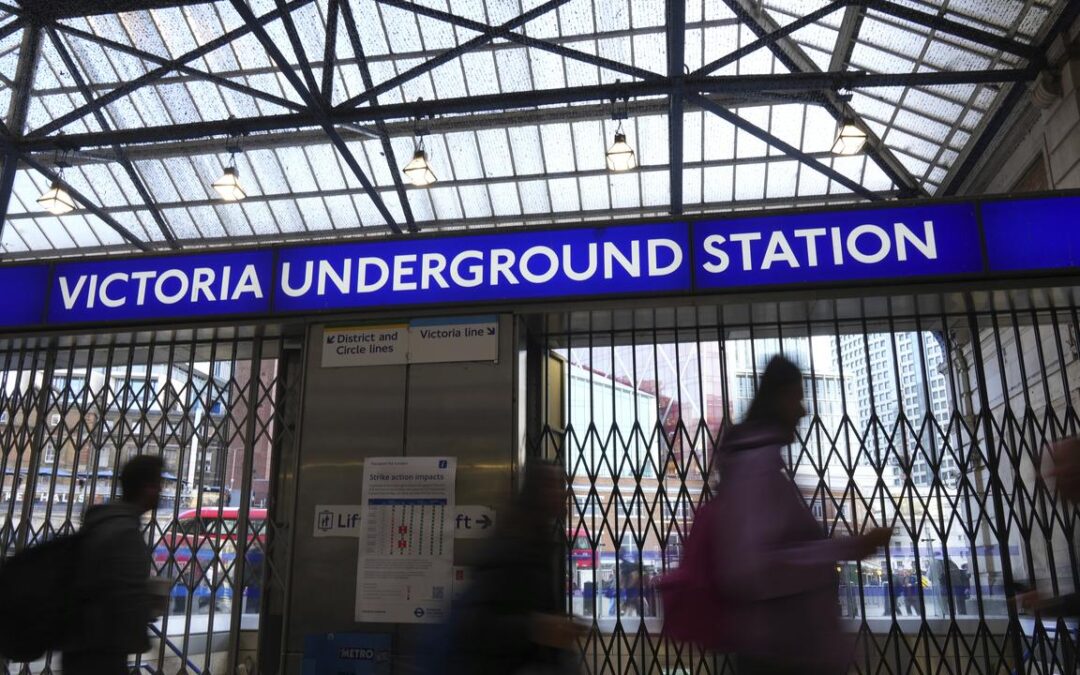
London’s Tube derailed as workers strike
London’s underground rail network has ground to a halt as staff began a week of strikes over pay and working conditions, disrupting travel for commuters and tourists.
Almost no underground trains are expected to run until Thursday, so that people who take 3.7 million daily journeys on the “Tube” were either working from home or finding other ways to get around.
Forest, which operates 15,000 e-bikes in London, said it experienced four times its usual demand by 9am local time.
Other commuters switched to buses, or relied on the few other train lines that were working, with most reporting longer journeys.
“The prospect of it being all week, it’s a bit of a nightmare,” said legal counsel Laura Sutton, 46, who was near London Bridge station on Monday.
Transport for London, which operates the public transport network, said it had offered staff a 3.4 per cent pay rise, but that the union would only accept a deal that led to a reduction in the working week.
The RMT trade union said the dispute centred on pay, fatigue management, shift patterns and a reduction in hours.
Prime Minister Keir Starmer’s spokesperson told reporters that he wanted a resolution.
“Londoners who are trying to get to work, trying to drop their kids off in school, businesses who rely on the Tube for work and footfall will be fed up with these strikes,” they said.
Outside the Tower of London, Peter Rolf, 58, from Germany, said his family had decided to cut their two-day trip to London to one, spending more time elsewhere in England.
Patricia Ware, 75, who was visiting from her home near Chicago in the US, said it had taken much longer than it should to reach the historic castle.
“We had trouble getting a taxi to get here,” she said.
But she was still enjoying London:
“Traveling at best is a hassle, so we just go with the flow.”
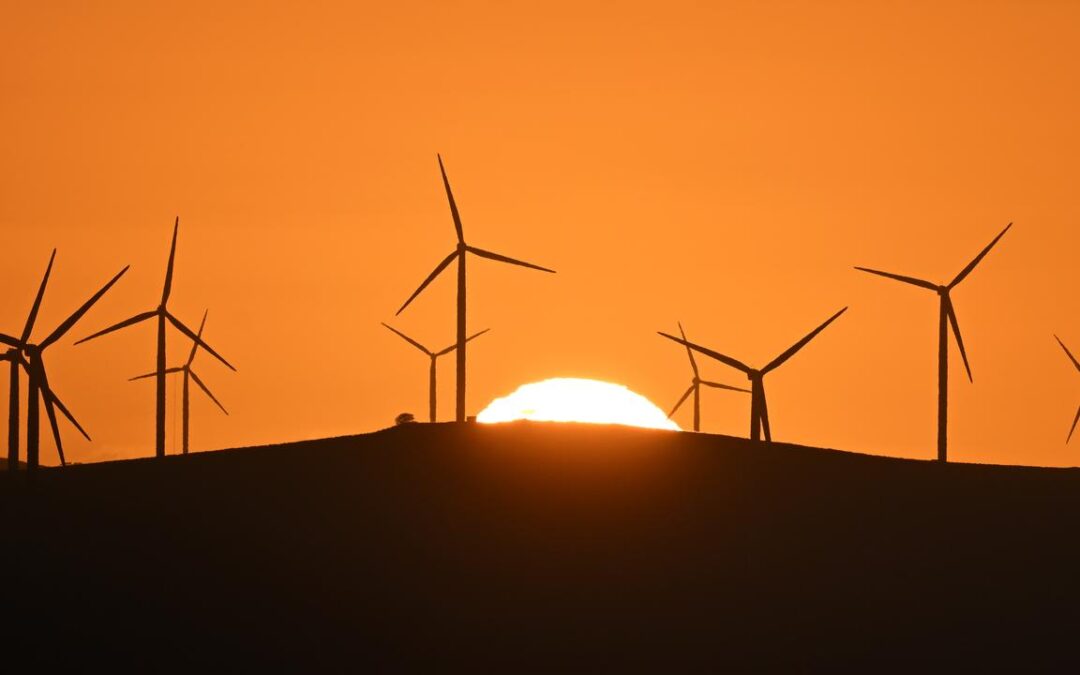
Big business seeks new dawn for environmental laws
Australia’s peak business lobby warns the nation’s project approvals process needs improvement under environmental law reform or significant investment will “amount to nothing”.
In an address to the Business Council of Australia’s annual dinner on Monday, chief executive Bran Black mirrored Anthony Albanese in speaking about the net-zero transition.
The prime minister said the private sector would play a defining role in fuelling economic growth linked to the renewables sector.
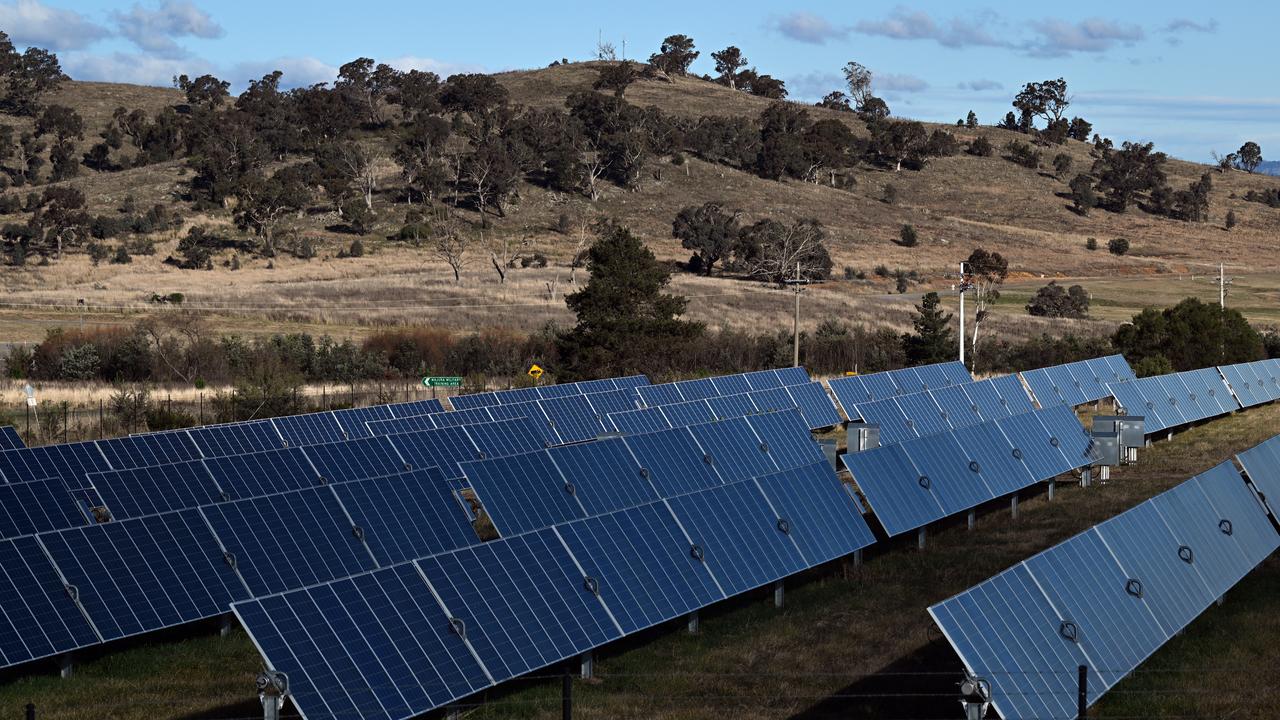
But Mr Black said business needed to plan with certainty if it was to have the confidence to invest.
He said while ambition mattered, how it was delivered was critical.
“I stress that that delivery is no more important than with respect to getting the project approvals process right with effective EPBC (Environment Protection and Biodiversity Conservation) reform,” he said.
“The significant capital investment required will amount to nothing if it gets bogged down in the current approval delays.”
Labor has promised to set up a national environment protection agency alongside reforms to environmental law which it says will restore trust in the rules.
The government will unveil its emission reduction target for 2035 in coming weeks.
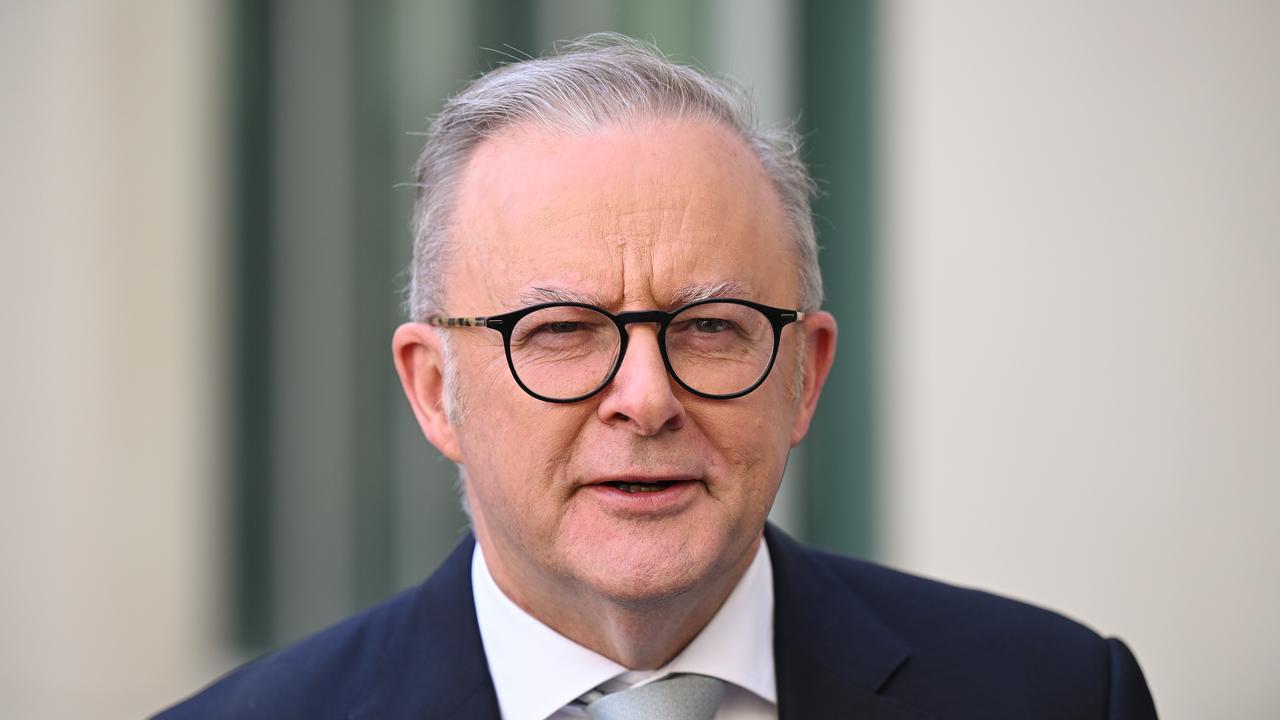
Mr Albanese said the global shift to clean energy was the “biggest economic transformation since the industrial revolution”.
“If we act now, if we get it right, we can set our nation up for a new era of growth and prosperity, one built on our strengths as a high-skill, fair-wage economy,” he said.
The remarks follow a report released on Friday by the peak business group, which said cutting emissions by up to 70 per cent would need capital investment of $530 billion.
The business council also said significant progress on building energy infrastructure was critical to reach emissions targets.
Mr Black said the nation’s tax system wasn’t competitive and a good place to start was cutting red tape.
“How is it, for example, that in a modern economy such as ours you need 36 separate licences and approvals just to pour a cup of coffee at a cafe in Victoria?” he said.
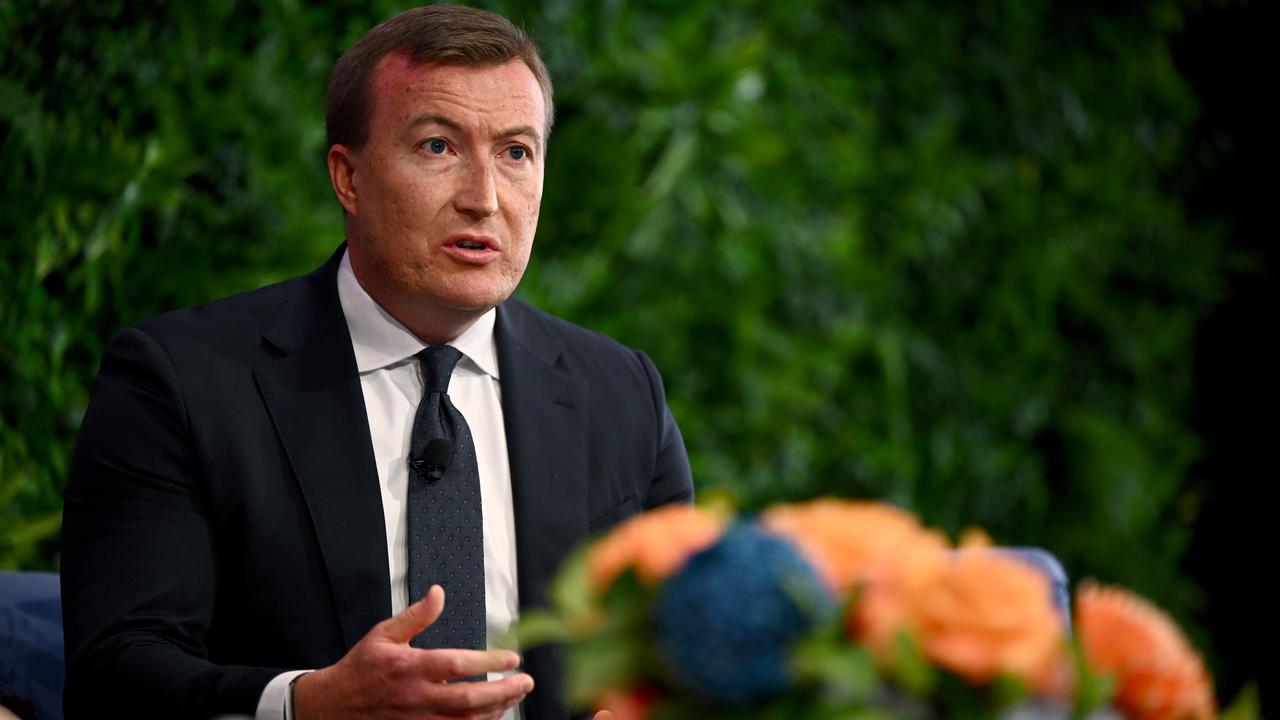
The business council would also remain “resolutely opposed” to policy ideas that scare investment away, he said.
These included “inflexible, unbalanced workplace relations settings” such as multi-employer bargaining and legislatively mandated work-from-home rules.
Following better-than expected growth figures, Mr Albanese said the economic approach of the government has been gathering strength.
The latest GDP figures showed 1.8 per cent growth in the year to June, surpassing the forecasts from the Reserve Bank of 1.6 per cent for the year.
“In a time of ongoing global economic uncertainty, there is no major advanced economy growing faster than Australia, and, importantly, this is being led by the private sector,” Mr Albanese said.
“The private sector is resuming its rightful place as the driver of growth in our economy.”
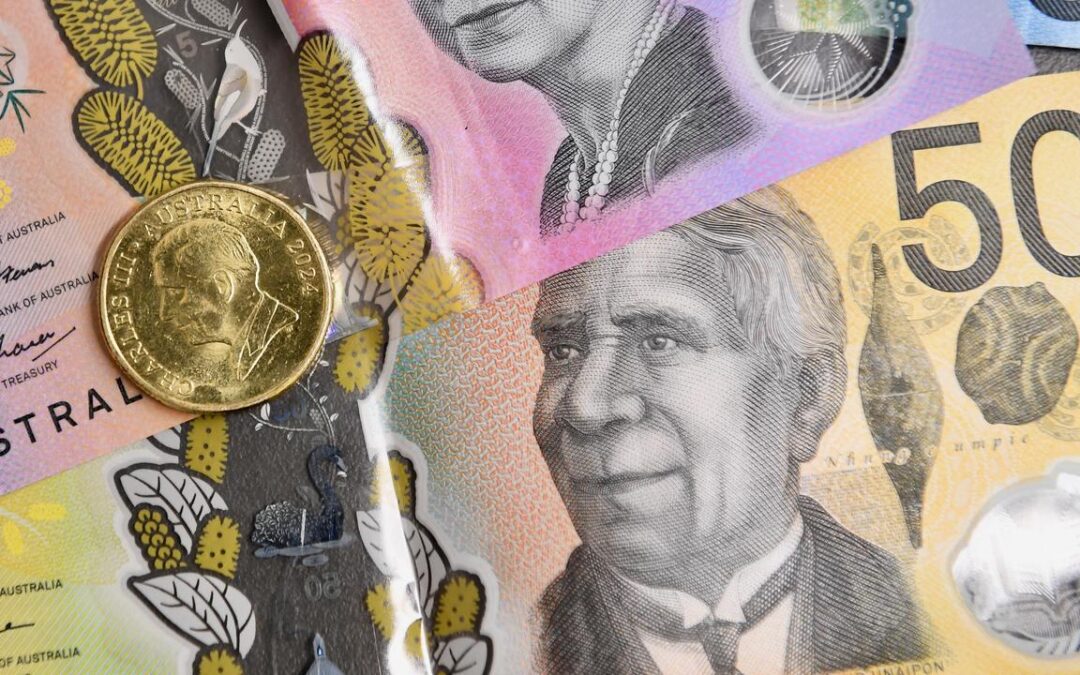
Retirement finances not so super for Indigenous people
With more than half of Indigenous people dying before they can access the age pension, researchers have found simple changes to the system may reduce the disadvantage they face.
University of Queensland associate professor Levon Blue said everyone deserved to retire with dignity but the system was not set up with First Nations people in mind.
“The retirement income system in Australia was designed initially to meet the needs of male, white full-time public servants, and it’s essentially a one-size-fits-all model,” she told AAP.
“It doesn’t take into consideration difference, especially differences in life expectancies.”
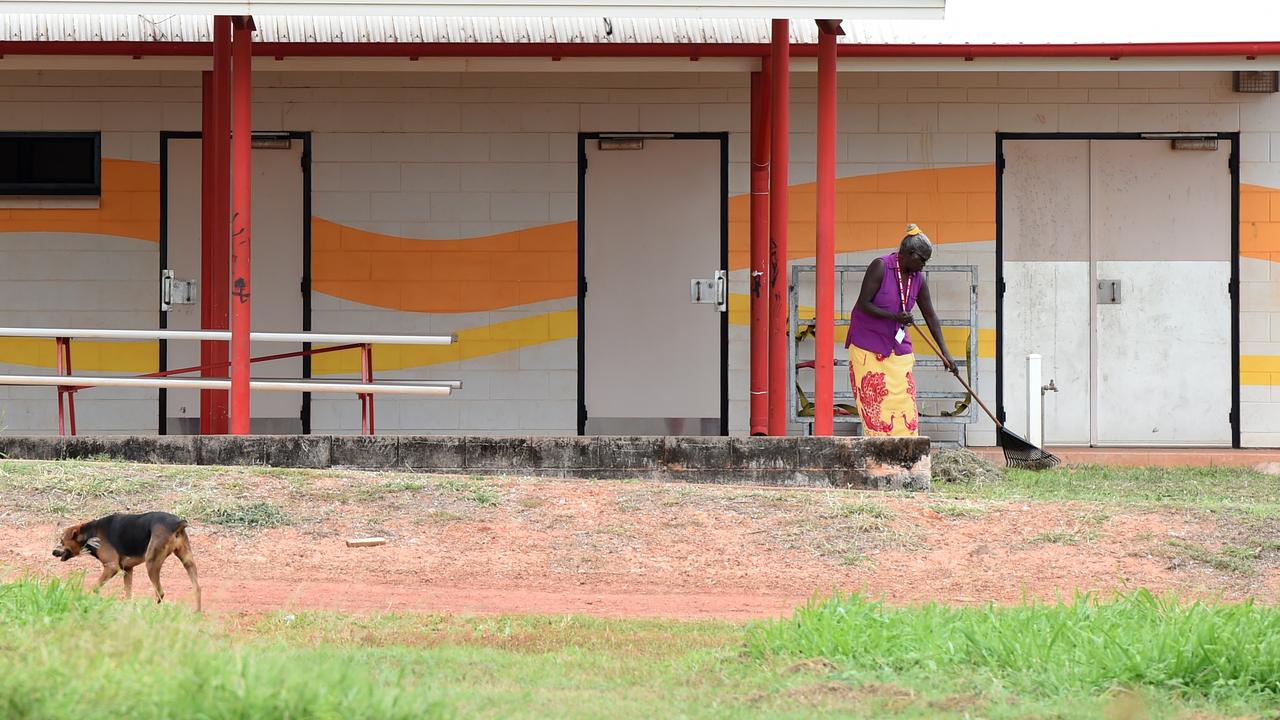
It’s not only the discrepancy in life expectancy impacting Indigenous people’s superannuation and age pension.
University of New England Indigenous pro vice-chancellor and study co-author Peter Anderson said Aboriginal and Torres Strait Islander people earn up to 30 per cent less than non-Indigenous counterparts.
Higher rates of insecure work and a history of economic injustice, including the practice of stolen wages, where Indigenous people were paid little or not at all for their labour, also contribute to this situation, the Warlpiri and Murinpatha man said.
“Economic justice for our old people and Elders is actually having access to their superannuation or access to funds,” Prof Anderson said.
“We have high earning potentials, yet we can’t access the money of the system.”
Some employment schemes, such as the community development program (CDP), which is being phased out after more than 20 years of operation under various names, have not required compulsory superannuation payments, leaving those in the program short on retirement funds.
“I’m genuinely shocked to my core,” Prof Anderson said.
“Being from a remote community myself and lots of family from there who have been on CDP, and (superannuation) wasn’t even factored into the conversation.”
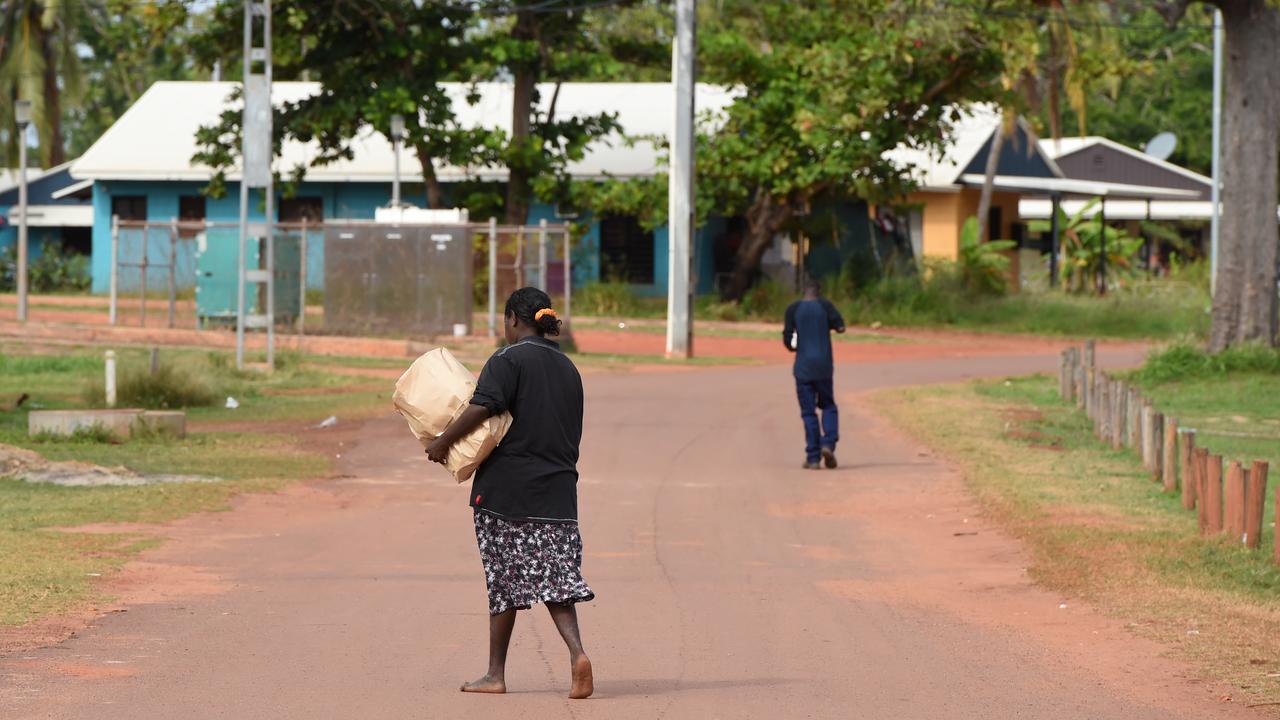
Alongside voluntary and compulsory contributions to superannuation and the age pension, the researchers have proposed adding another ‘pillar’ to Australia’s three-pronged retirement system which would allow for early accumulation of, and access to, superannuation.
This was something which could be beneficial to First Nations people as well as those with chronic illnesses or disability who faced a shorter life expectancy, they said.
Dr Blue said there had been recent changes, including payment of superannuation during maternity leave and early access to superannuation during the COVID-19 pandemic, which showed the system could be changed.
“This isn’t a new issue,” she said.
“It’s been talked about and advocated for for decades by unions and rights groups to lower the age for pension and super for Indigenous people and it still hasn’t occurred.”
The research has been published in the Australian Journal of Social Issues.
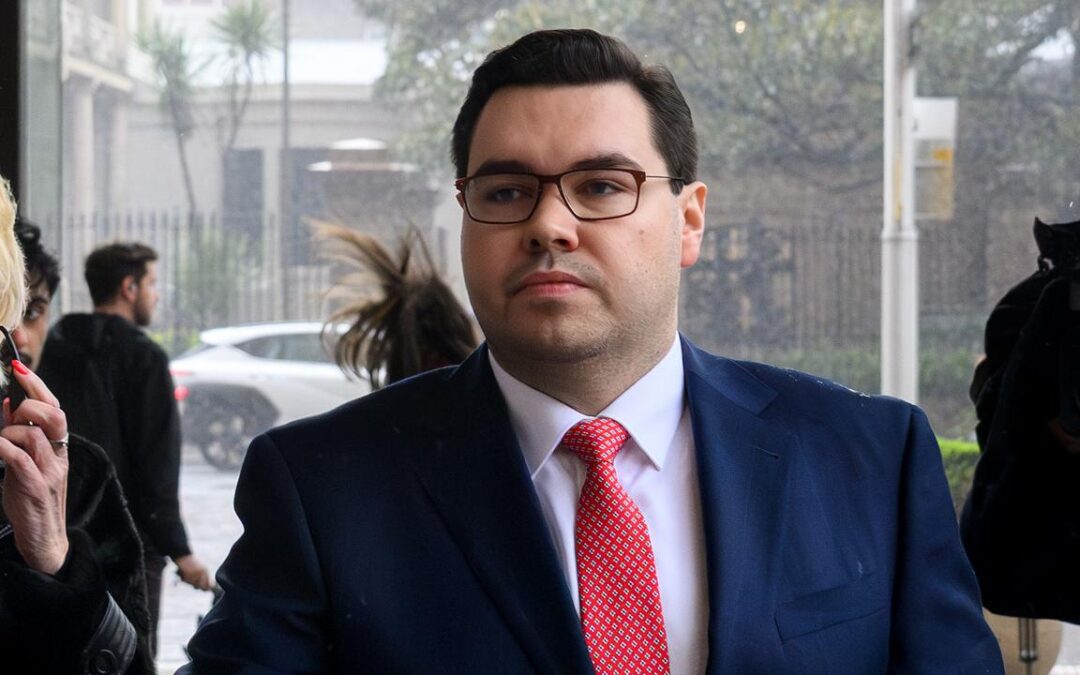
Lehrmann takes corruption watchdog boss to court
Despite being on the brink of bankruptcy as a result of court proceedings, embattled former Liberal staffer Bruce Lehrmann has lodged legal action against the head of a corruption watchdog and a federal minister.
The legal action was filed by Lehrmann personally at 9.30pm on Thursday under the classification of a “judicial review”, which asks the court to review the legality of a governmental decision.
Lehrmann has filed proceedings against the Commissioner of the National Anti-Corruption Commissioner Paul Brereton and federal Special Minister of State Don Farrell.
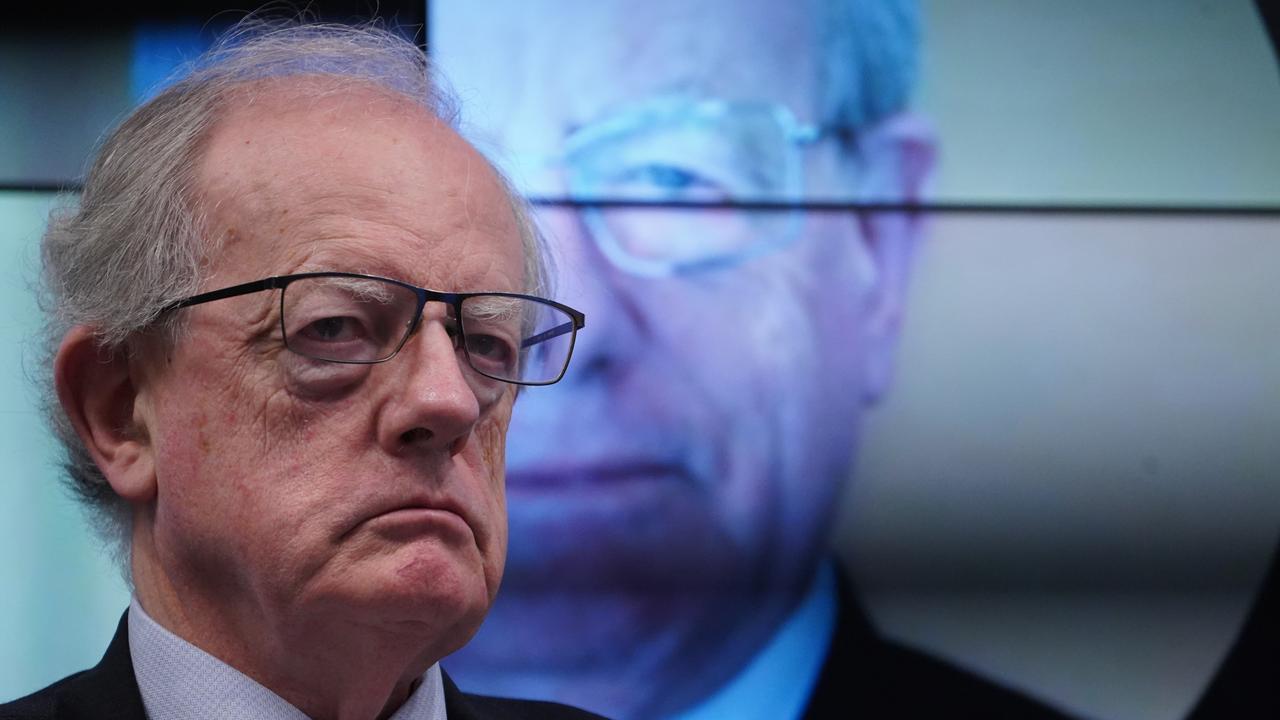
The nature of the proceedings is unknown as of Monday afternoon, but Lehrmann has been contacted for comment.
Mr Farrell’s office declined to comment and the National Anti-Corruption Commissioner said it was inappropriate to comment because the proceedings were before the court.
Lehrmann entered into the national consciousness after he was accused of raping his colleague Brittany Higgins inside Parliament House in 2019.
He has denied the claims, which remain untested in a criminal court after a 2022 trial in the ACT was abandoned because of juror misconduct.
But the Federal Court found in 2024 the allegations he raped Ms Higgins were proven on the balance of probabilities, which is a lower civil standard of proof than its criminal counterpart.
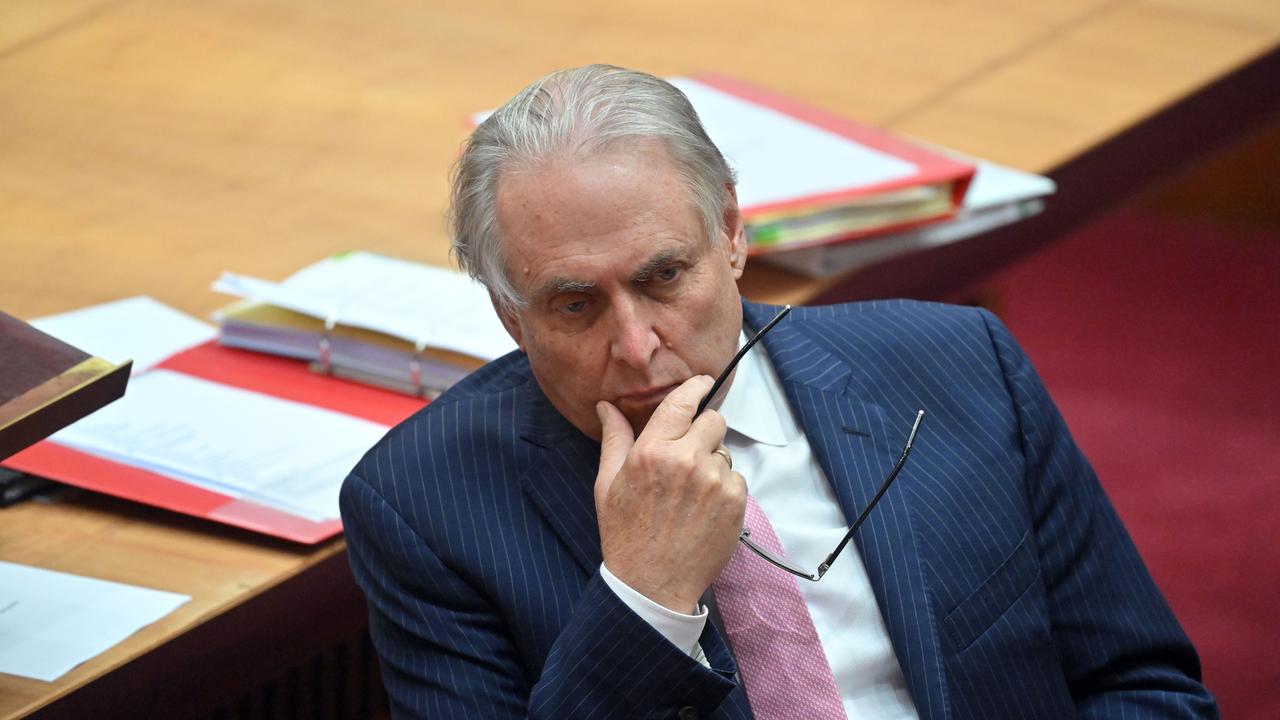
Lehrmann’s appeal against his defamation loss to Network Ten and journalist Lisa Wilkinsonwas heard by a panel of judges in August.
The justices reserved their decision to be delivered at a later date.
He claimed he was defamed by Ms Wilkinson’s 2021 interview with Ms Higgins on The Project in which Ms Higgins alleged she was raped.
Justice Michael Lee found the allegations were likely true in his headline-grabbing judgment in April 2024.
“Having escaped the lions’ den, Mr Lehrmann made the mistake of going back for his hat,” the judge quipped at the time.
1800 RESPECT (1800 737 732)
National Sexual Abuse and Redress Support Service 1800 211 028
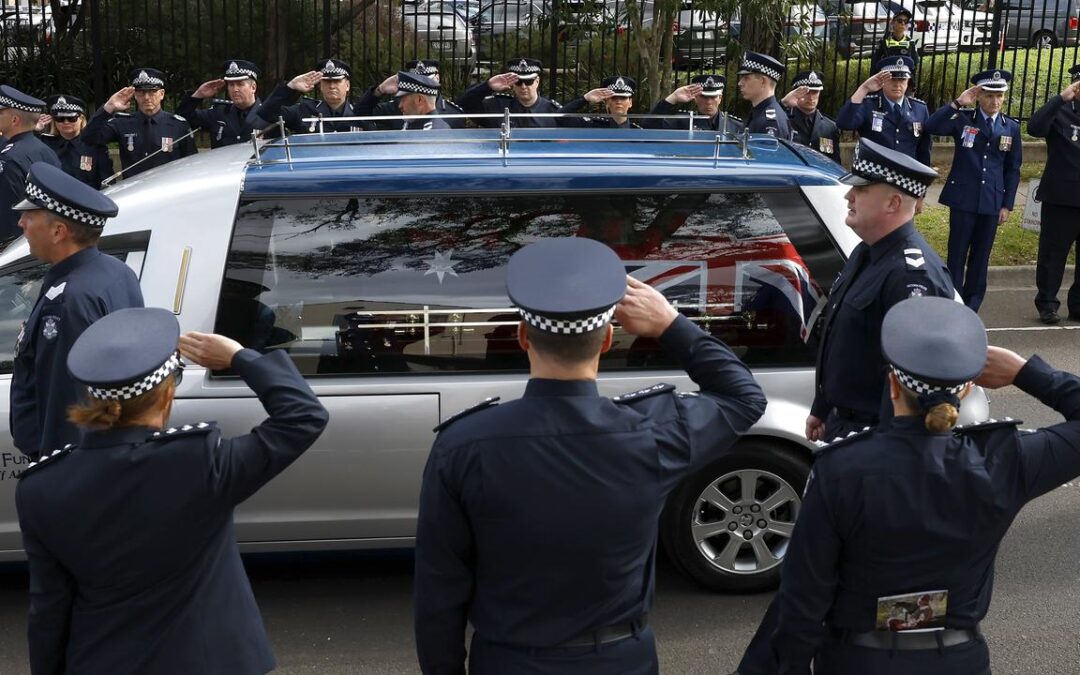
‘Steve Irwin gene’: slain veteran cop’s bravery saluted
Idolised and adored for his “Steve Irwin gene”, a retiring policeman has been hailed for the relentless bravery that ultimately robbed him of his life.
Family, friends, colleagues and political leaders were among the estimated 3000 people who farewelled Detective Leading Senior Constable Neal Thompson at the Victoria Police Academy on Monday.
The 59-year-old was one of two officers killed on August 26 while serving a warrant on Dezi Freeman at a property in Porepunkah, about 300km northeast of Melbourne.
His partner, Sergeant Lisa Thompson, broke down while leading tributes for the man affectionately known as “Thommo”.
She met Det Sen Const Thompson, a mad fisherman, shooter and Essendon supporter, in 2016 after arriving at Wangaratta Police Station as a constable.
“We worked one shift together and it changed the course of my life,” Sgt Thompson told the packed crowd in the on-site chapel.
“I had never laughed so much with someone I’d just met.”
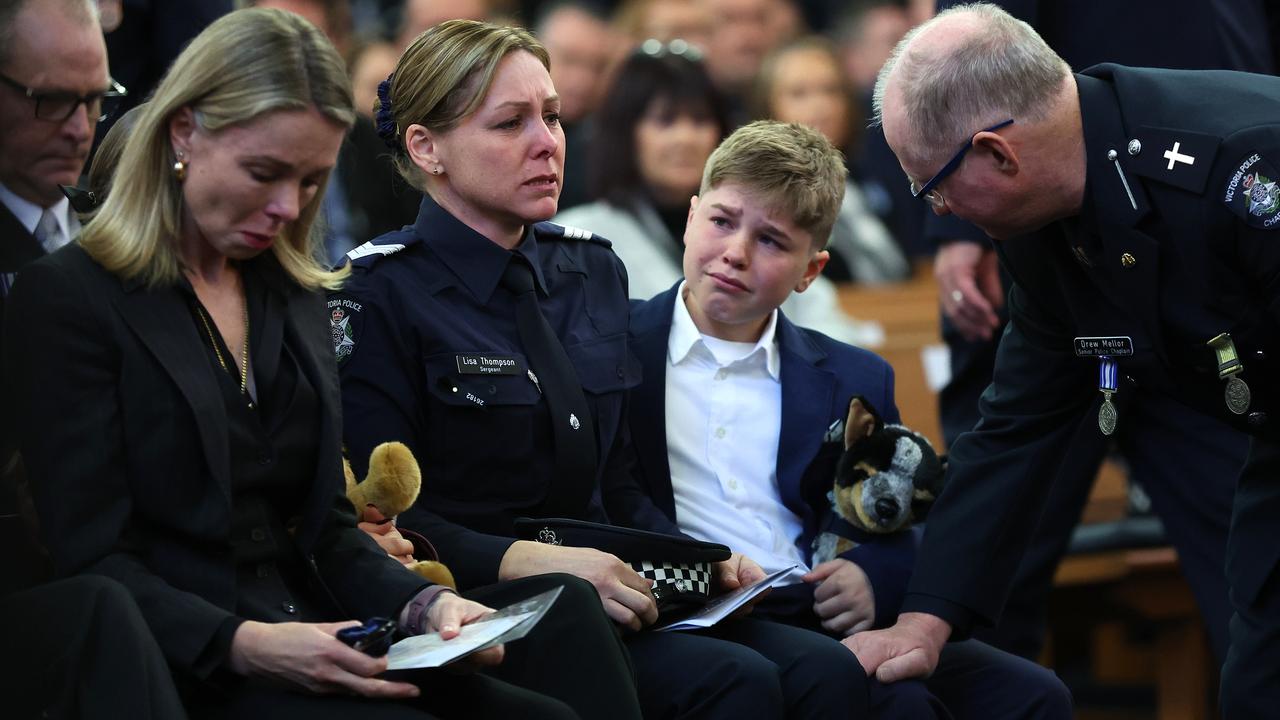
They were “opposites in every way” but “unstoppable” together.
Det Sen Const Thompson formed a close bond with her children, greeting them each day with “hey midget have you done your push ups”.
The couple’s last weekend was spent working on their farm before wining and dining and gazing at the stars, leaving nothing unsaid.
Sgt Thompson said he taught her how to love without fear and how to be brave when scared.

“Honey, I’m so grateful you did because I am scared,” the Benalla-based sergeant said.
“I don’t want to live my life without you and I don’t want to finish our dreams on my own. But I will, I promise.”
Photos of Det Sen Const Thompson were on display in the chapel along with four medals, including a posthumously awarded Victoria Police Star.
When talking about his will, he once quipped he didn’t need one because he was never going to die.
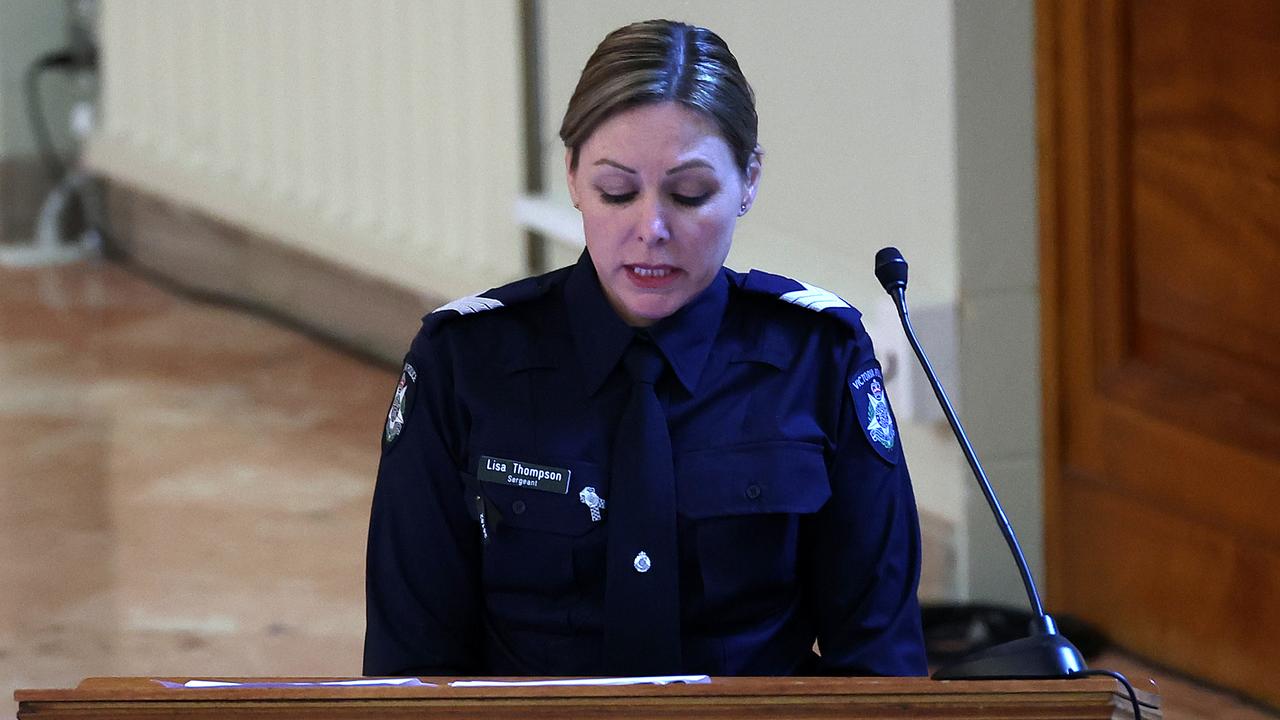
“If only that was true,” his sister Lois Kirk said through tears.
“You were the golden boy, the adventurer, the protector.”
Det Sen Const Thompson joined the police in 1987 and worked his way up to detective at the Major Fraud Squad and the State Crime Squad, before shifting to Wangaratta to join the Crime Investigation Unit in 2007.
Colleague Paul Campbell said he made coming to work a pleasure and thought he was “indestructible” despite having previously been shot, stabbed, rolled cars and beaten cancer.
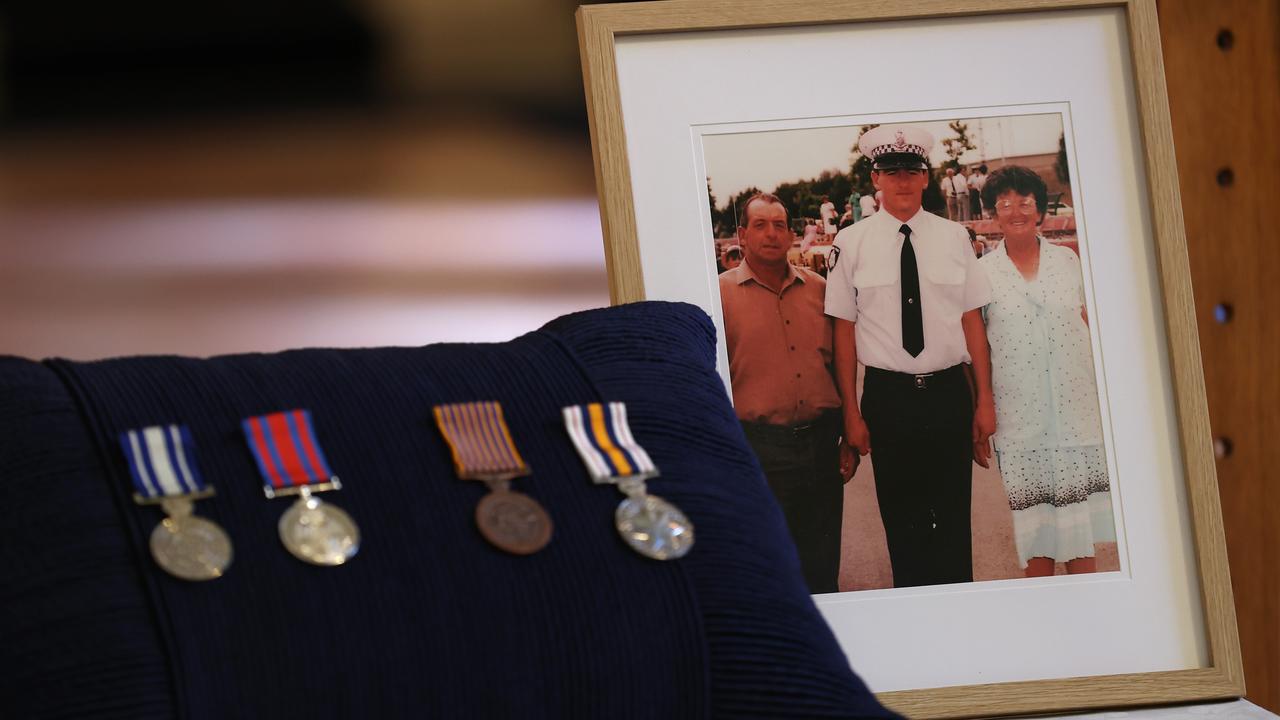
“He had also been in 16 police collisions, actually 17 – that was a couple of weeks ago,” he said.
Det Sen Const Thompson was due to work his last shift on September 5 and had said he was “going to miss this stuff” ahead of his retirement.
The 38-year career veteran was “robbed of a very well-deserved retirement”, Chief Commissioner Mike Bush said.
Leading Senior Constable Timothy Doyle said the stalwart detective was the man officers went to if they needed to get a crook to talk or something found in a raid.
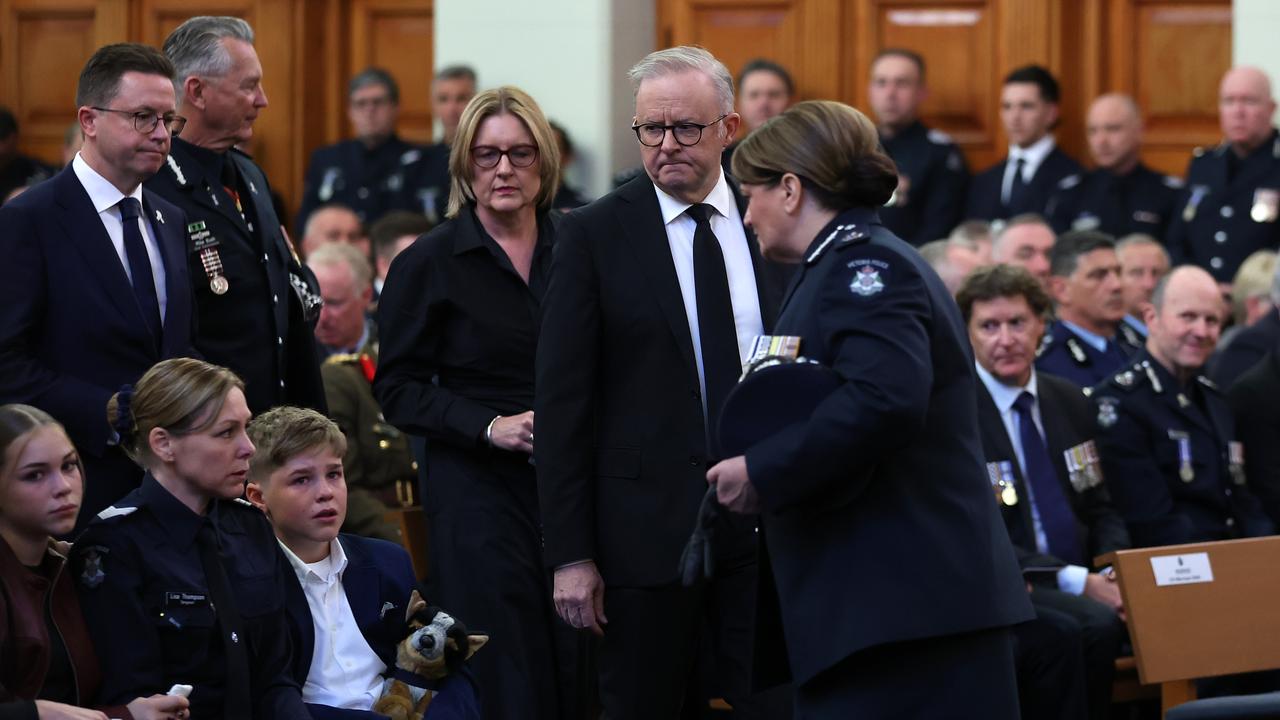
“You went through the door first and I owe you my life for that,” he said.
Speaking on behalf of Det Sen Const Thompson’s fishing, hunting, soccer, rock-climbing and farming mates, Jason Williams said he had the “Steve Irwin gene”.
That was on show 20 years ago when the pair went on a trip to the Top End.
“Out of the blue, he started walking barefoot through the long grass after a king brown snake, dragging six-foot sharks into a 12-foot boat or jumping waist deep into waters inhabited by crocodiles,” his long-time friend said.
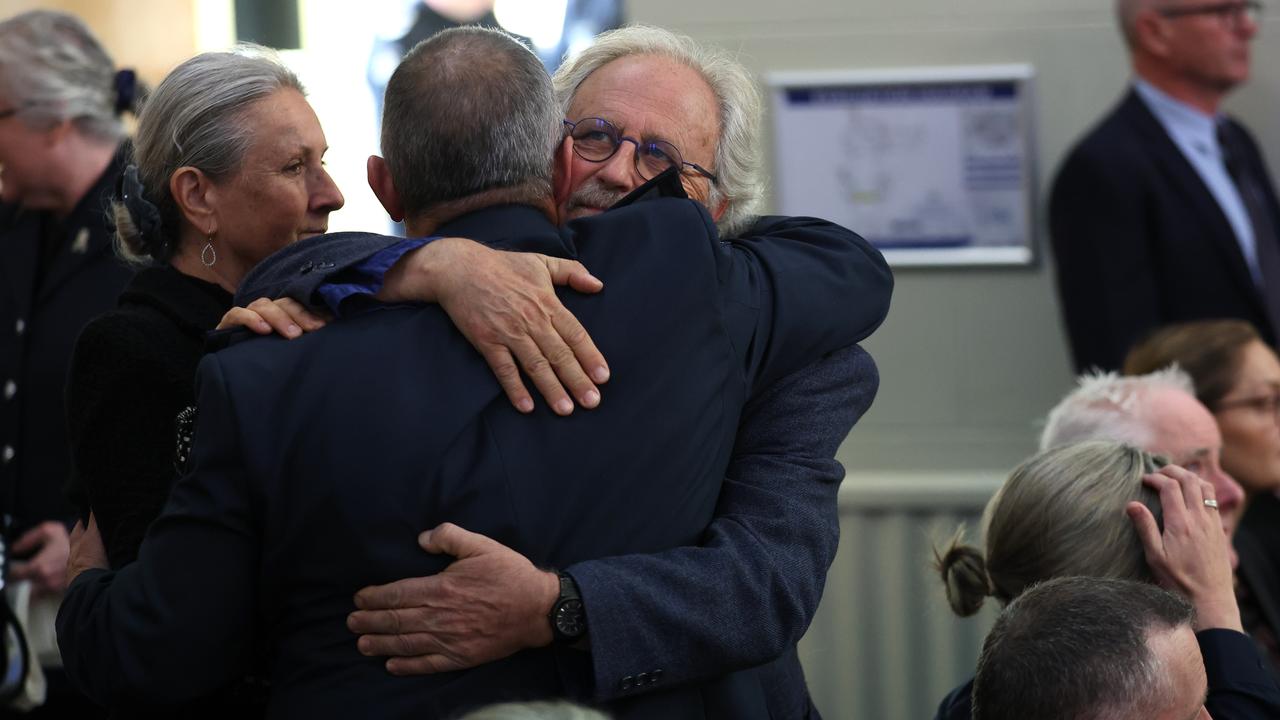
Uniformed police formed a guard of honour stretching hundreds of metres for the hearse carrying the officer’s coffin.
The scene mirrored Friday’s service for Senior Constable Vadim de Waart-Hottart, who lost his life in the same incident.
The 34-year-old’s Belgian parents attended Monday’s service, along with the third injured officer who survived the alleged ambush by Freeman, who remains on the run.
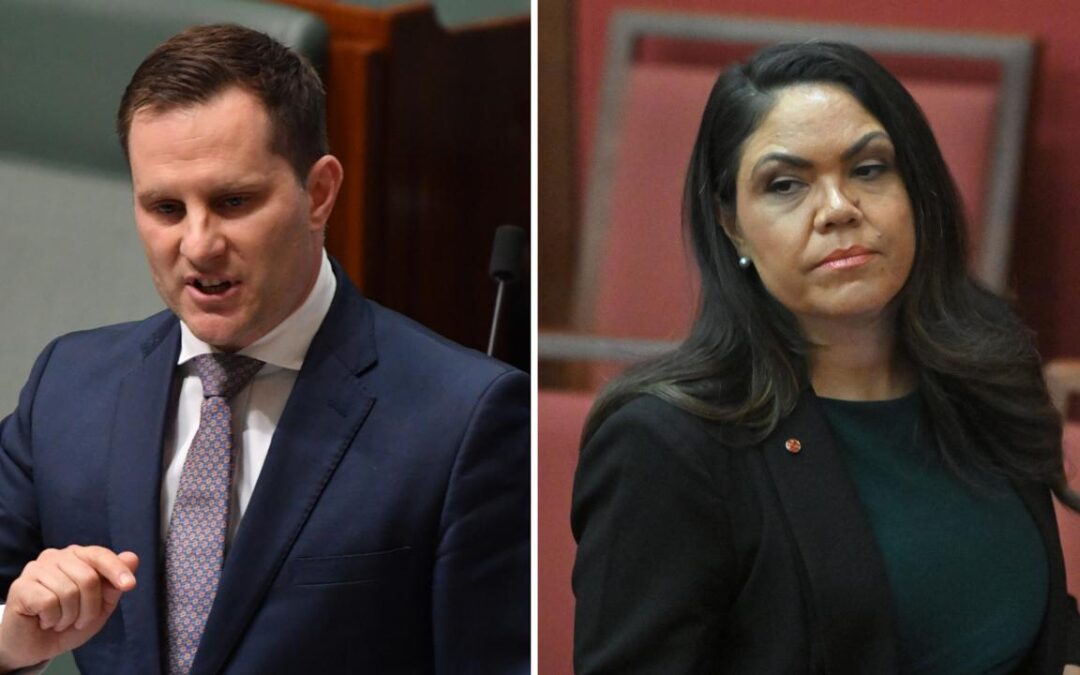
Libs feud as power broker wants Indian comment apology
A war of words between Liberal firebrands has sparked concerns the party continues to marginalise the Indian community following disparaging comments.
Liberal power broker Alex Hawke has urged Senator Jacinta Nampijinpa Price to formally apologise for comments about the federal government bringing in more Indian migrants because they vote Labor.
“If we’re going to have a debate about migration numbers that’s fine but we don’t single out communities and we certainty don’t target Indian communities,” Mr Hawke said.
He said he urged the Northern Territory senator to make a social media video because “the way to minimise this was to apologise quickly and to get it out there”.
“This was a particularly bad week for these comments” after the flyers at anti-immigration rallies singled out the Indian community, Mr Hawke said.
“The damage is ongoing, I think if an apology was offered early on and just a quick walk back, that would have helped but there’s still time and I think the community should hear from her.”
Liberals have publicly and privately urged Senator Nampijinpa Price to issue an apology, saying the comments continued to cause brand damage five days after they were made.
But the saga is tearing at the seams internally.
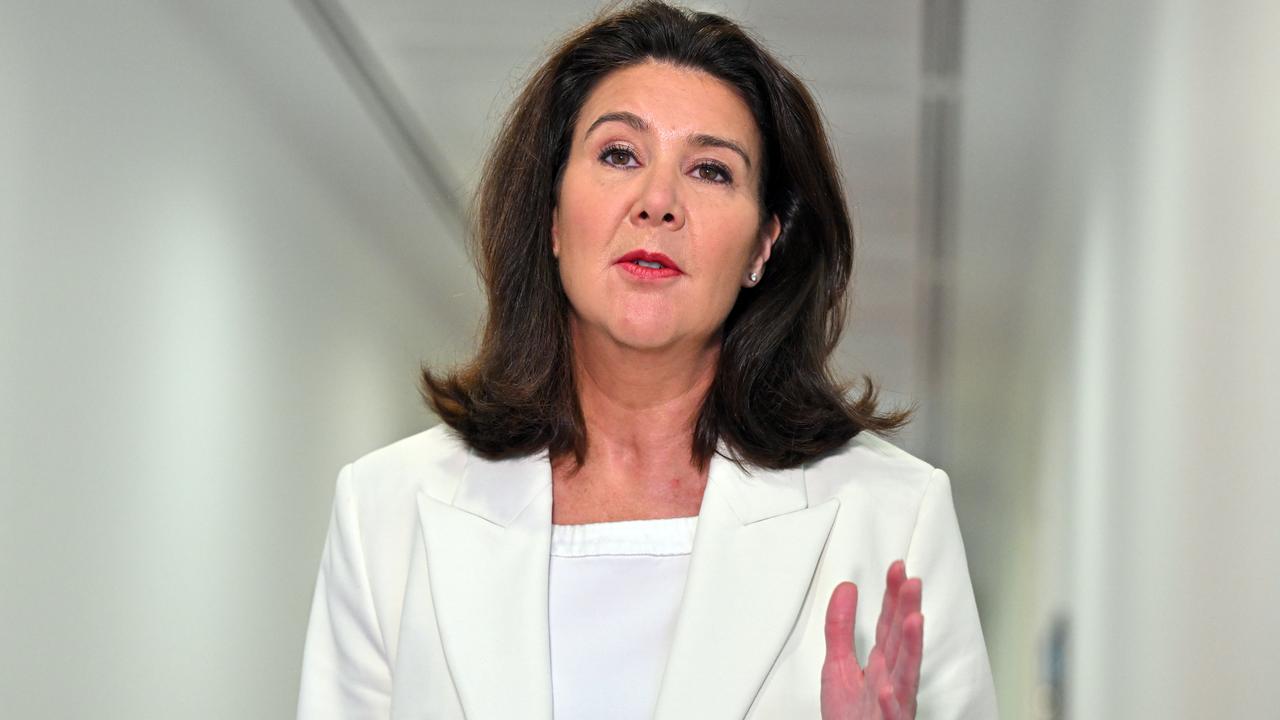
Senator Nampijinpa Price said Mr Hawke “chose instead to berate one of my staff” when he couldn’t get hold of her after calling her office.
The NT senator said the Liberal Party’s “women problem” was exacerbated when people “don’t stand up for women when they are mistreated by our own colleagues”.
“(Mr Hawke) even pressed my staff that if I did not comply with his requests, I may end up like another female member of the coalition, who I won’t name,” she said.
Mr Hawke said he had a one to two-minute conversation with a staff member but rejected the characterisation and denied he implied there would be repercussions for her political career if she didn’t apologise.
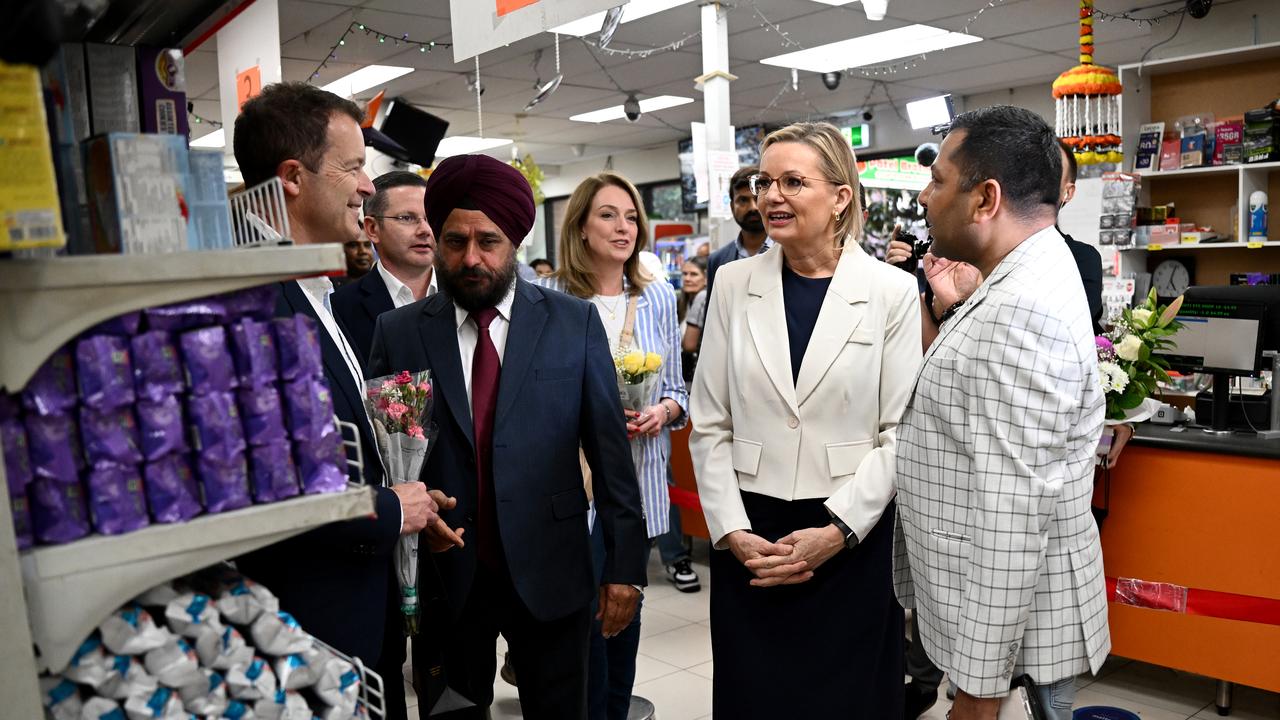
But pushed on whether the reference was to Liberal Senator Jane Hume, who was demoted to the backbench after the bruising election defeat, Mr Hawke said, “I’m not going to go into what I discussed back and forth”.
“She said a lot of things and I said a lot of things and they’re not for publication.”
Senator Hume said any breach of parliament’s standards needed to be reported.
“I would hope that the Liberal Party has moved on from some of the bad behaviour in the past but that’s going to be up to the leader to demonstrate what behaviour and standards she expects of the people that work around her,” she told Sky News.
“I would hope that we can move past this very quickly, let’s be honest, the Australian public expect more of us.”
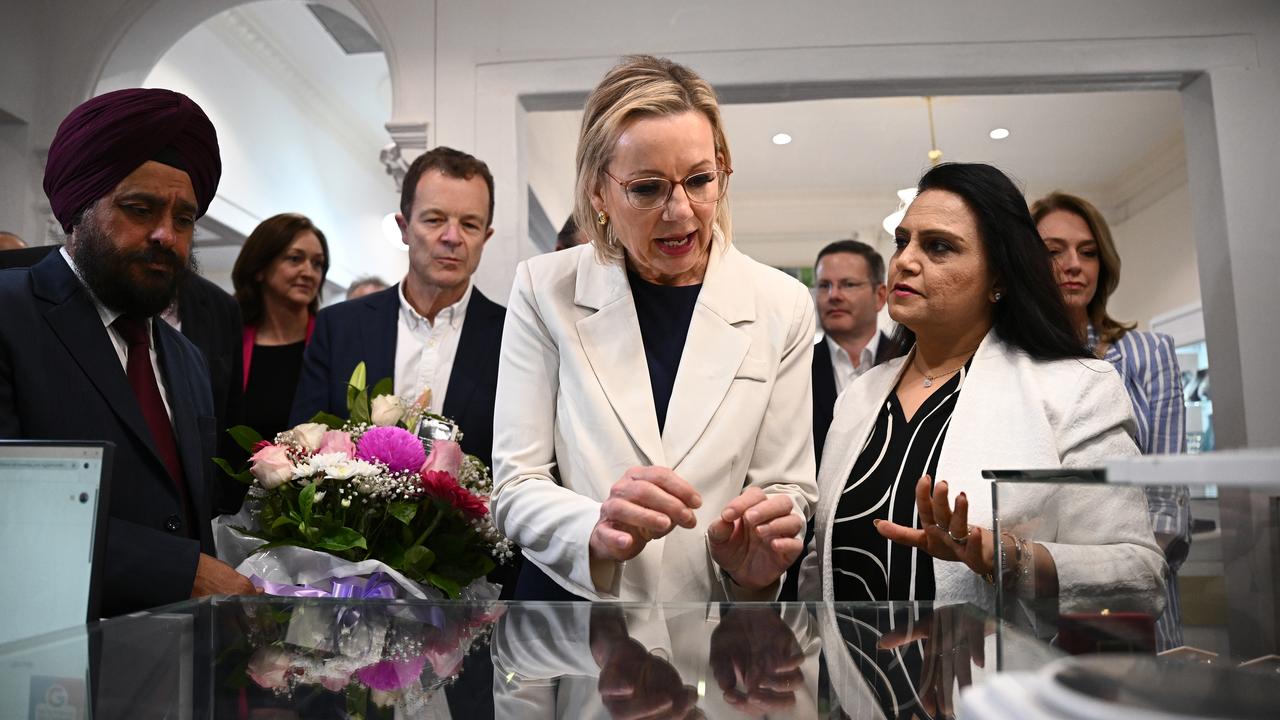
Opposition Leader Sussan Ley has been in damage control, putting up social media videos supporting the Indian community and touring Sydney’s Little India to speak with community leaders before holding a roundtable on Monday.
Ms Ley’s office said she wouldn’t comment on private conversations when asked if she had spoken to Mr Hawke or Senator Nampijinpa Price.
Liberal Senator Maria Kovacic, who was among the coalition contingent at Little India, told ABC Radio people “were upset and they were hurt by the comments, and that they didn’t consider the comments to be true”.
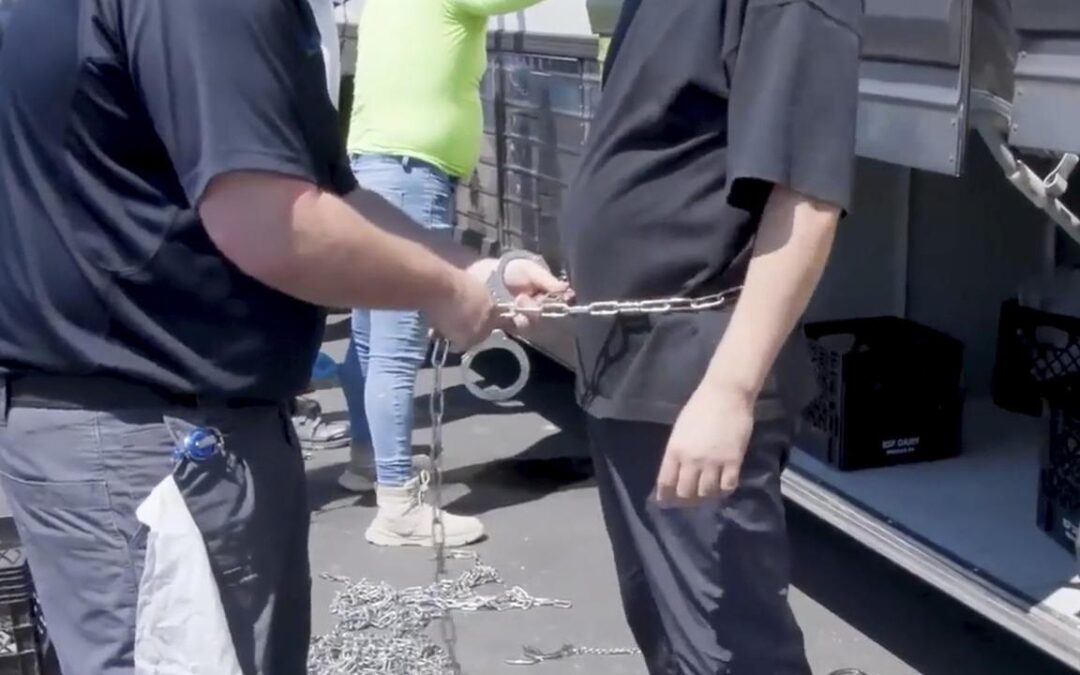
S.Korea to bring home 300 workers detained in US raid
More than 300 South Korean workers detained following a massive immigration raid at a Hyundai plant in the US state of Georgia will be released and brought home, the South Korean government has announced.
Kang Hoon-sik, chief of staff for President Lee Jae Myung, said South Korea and the US had finalised negotiations on the workers’ release.
He said South Korea plans to send a charter plane to bring the workers home as soon as remaining administrative steps are completed.
Foreign Minister Cho Hyun is to leave for the US on Monday for talks related to the workers’ releases, South Korean media reported.
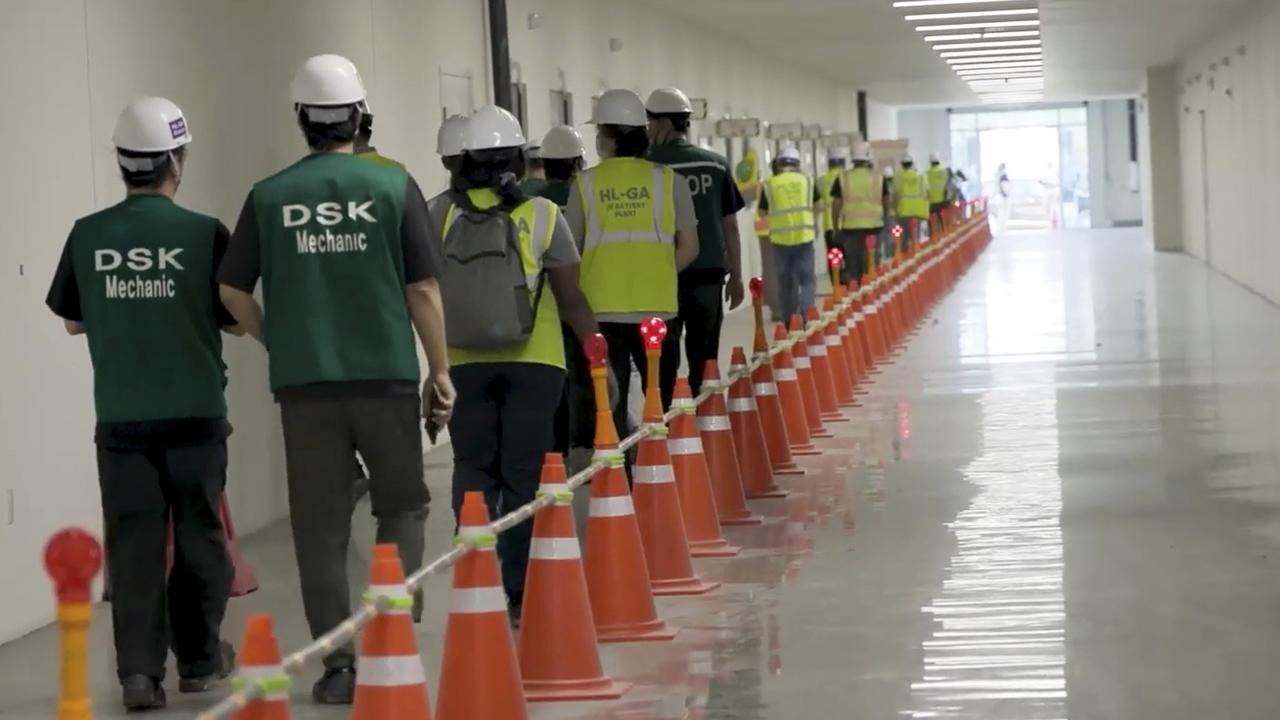
US immigration authorities said on Friday they detained 475 people, most of them South Korean nationals, when hundreds of federal agents raided Hyundai’s sprawling manufacturing site in Georgia where the Korean automaker makes electric vehicles.
Cho said more than 300 South Koreans were among the detained. The operation was the latest in a long line of workplace raids conducted as part of the Trump administration’s mass deportation agenda.
But it was especially distinct because of its large size and because the targeted site has been touted as Georgia’s largest economic development project.
The raid stunned many in South Korea because the country is a key US ally. It agreed in July to purchase $US100 billion ($A153 billion) in US energy and make a $US350 billion ($A534 billion) investment in America in return for the US lowering tariff rates.
About two weeks ago, US President Donald Trump and Lee held their first meeting in Washington.
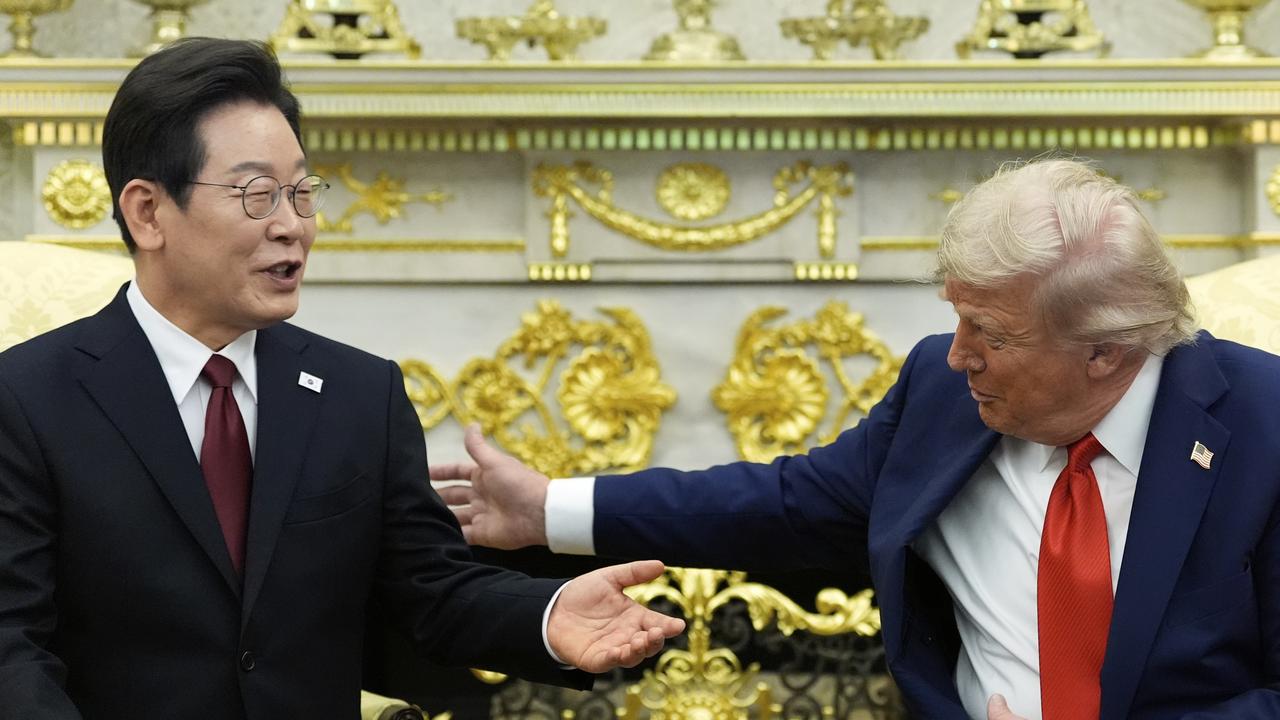
Trump said perhaps the US could work out an arrangement with South Korean workers who would train American citizens to do work such as battery and computer manufacturing.
“If you don’t have people in this country right now that know about batteries, maybe we should help them along and let some people come in and train our people,” Trump said on Sunday night.
He added “the way you train people is bring people in that know what they’re doing, let them stay for a little while and help.”
Lee said the rights of South Korean nationals and economic activities of South Korean companies must not be unfairly infringed upon during US law enforcement procedures.
South Korea’s Foreign Ministry separately issued a statement to express “concern and regret” over the case and sent diplomats to the site.
Steven Schrank, the lead Georgia agent of Homeland Security Investigations, told a Friday news conference some of the detained workers had illegally crossed the US border, while others had entered the country legally but had expired visas or had entered on a visa waiver that prohibited them from working.
Kang, the South Korean presidential chief of staff, said South Korea will push to review and improve visa systems for those travelling to the US on business trips for investment projects.
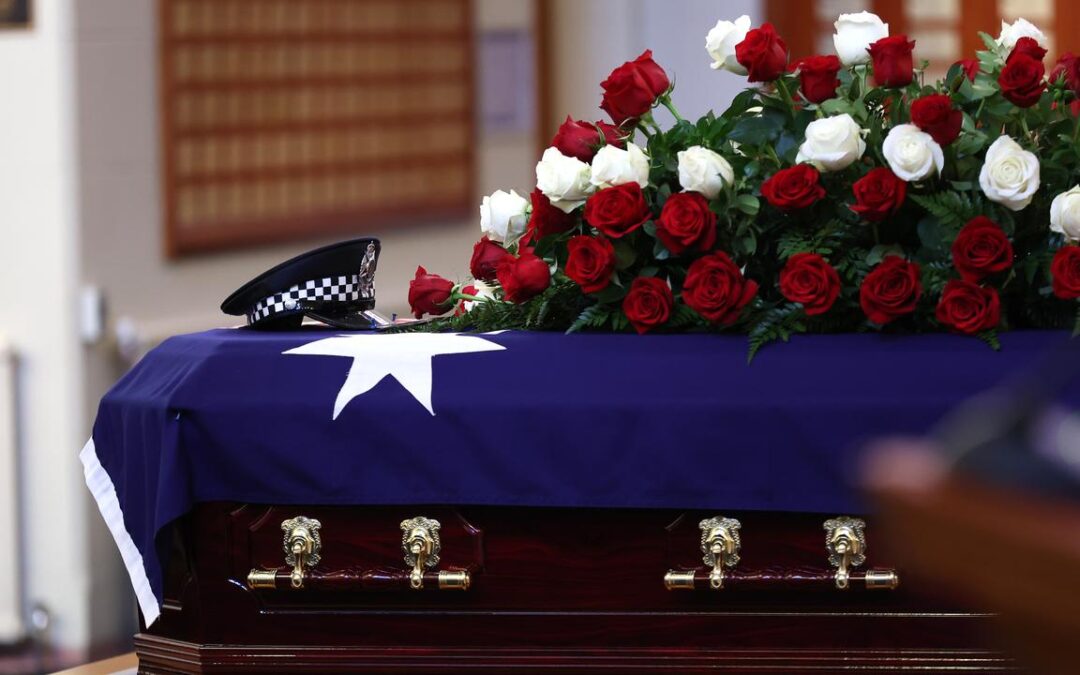
‘Steve Irwin gene’: tributes flow for slain veteran cop
Tears have flowed, mixed with laughter, for a larger-than-life veteran policeman gunned down just over a week before he was supposed to retire.
Detective Leading Senior Constable Neal Thompson was farewelled with full police honours in a funeral at the Victoria Police Academy on Monday.
The 59-year-old was one of two officers killed on August 26 while serving a warrant on Dezi Freeman at a property in Porepunkah, about 300km northeast of Melbourne.
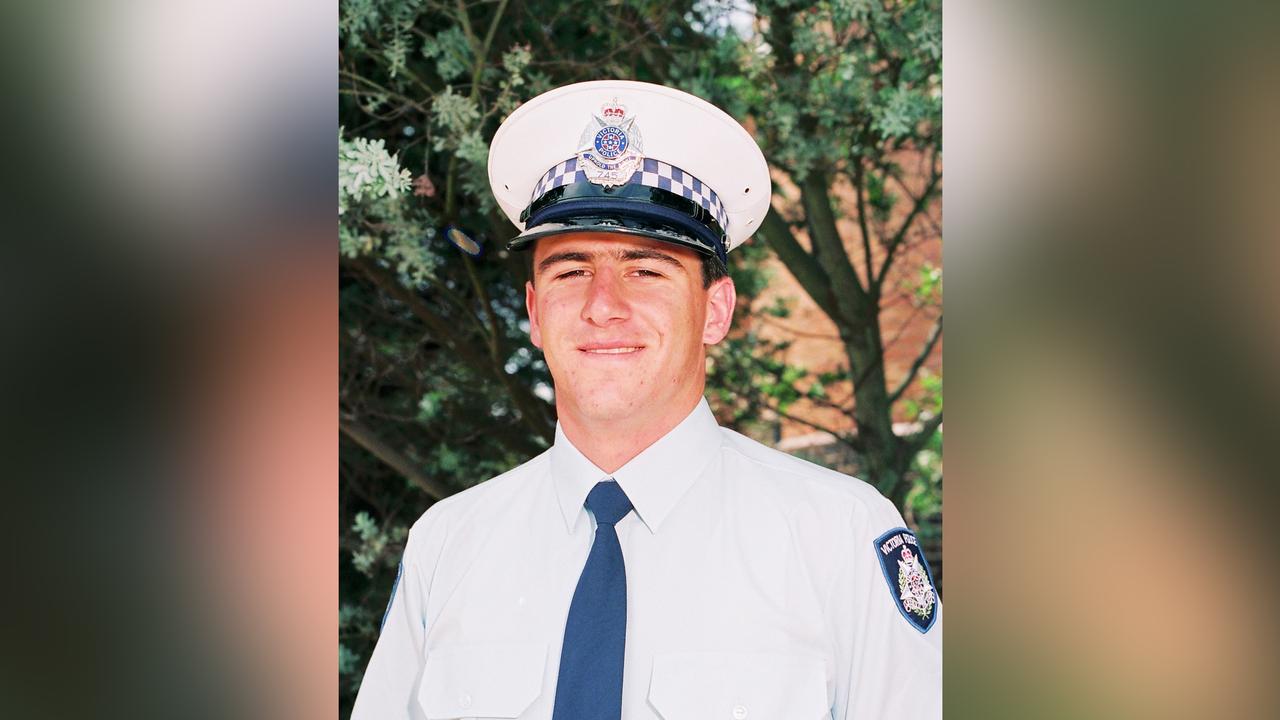
His partner, Sergeant Lisa Thompson, broke down while leading the tributes for the man affectionately known as “Thommo”.
She met Det Sen Const Thompson in 2016 after arriving at Wangaratta Police Station as a constable.
“We worked one shift together and it changed the course of my life,” Sgt Thompson told mourners.
“I had never laughed so much with someone and as I drove home that night reflecting on my day, I knew with absolute certainty that I wanted to be a detective.”
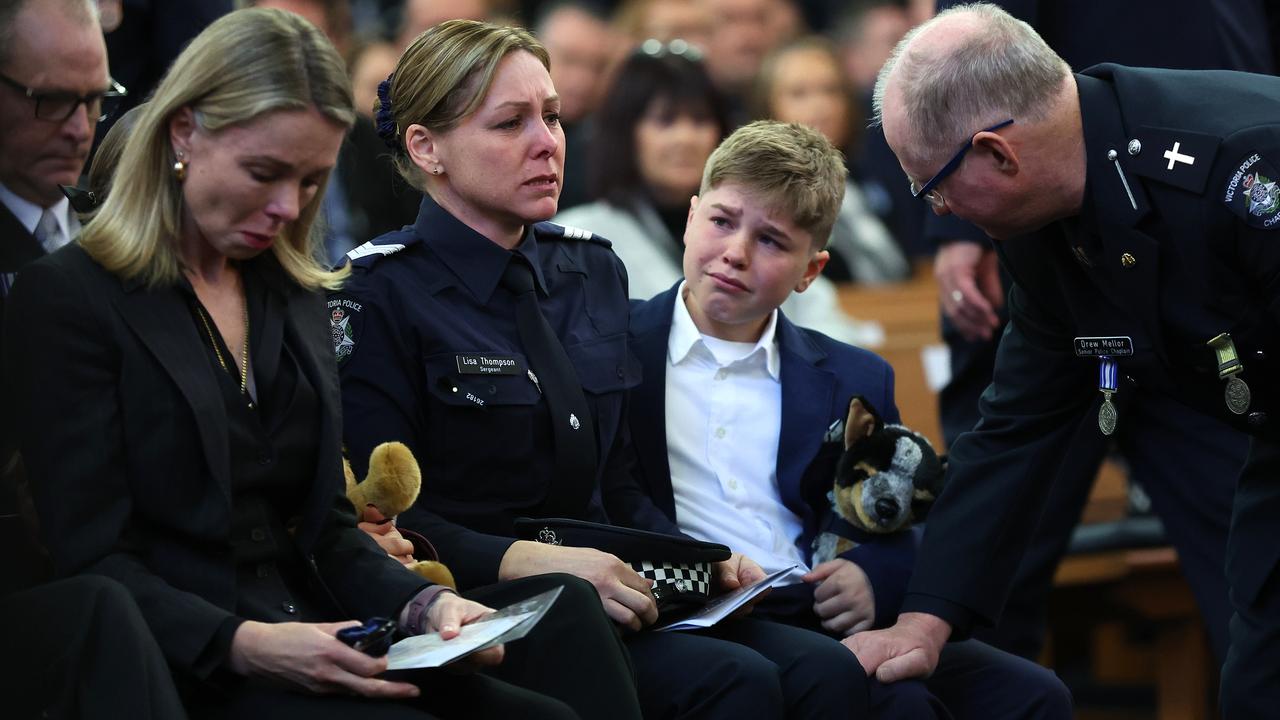
They were “opposites in every way” but “unstoppable” together, and he formed a close bond with her children.
“He greeted the kids each day by saying, ‘hey midget have you done your push ups’,” the Benalla-based sergeant said.
Their last weekend was spent working on their farm before wining and dining under the stars, leaving nothing unsaid.
“I don’t want to live my life without you and I don’t want to finish our dreams on my own,” Sgt Thompson said.
“But I will, I promise.
“I will be brave, I will love you, I will honour and cherish every moment that I spent with you.”
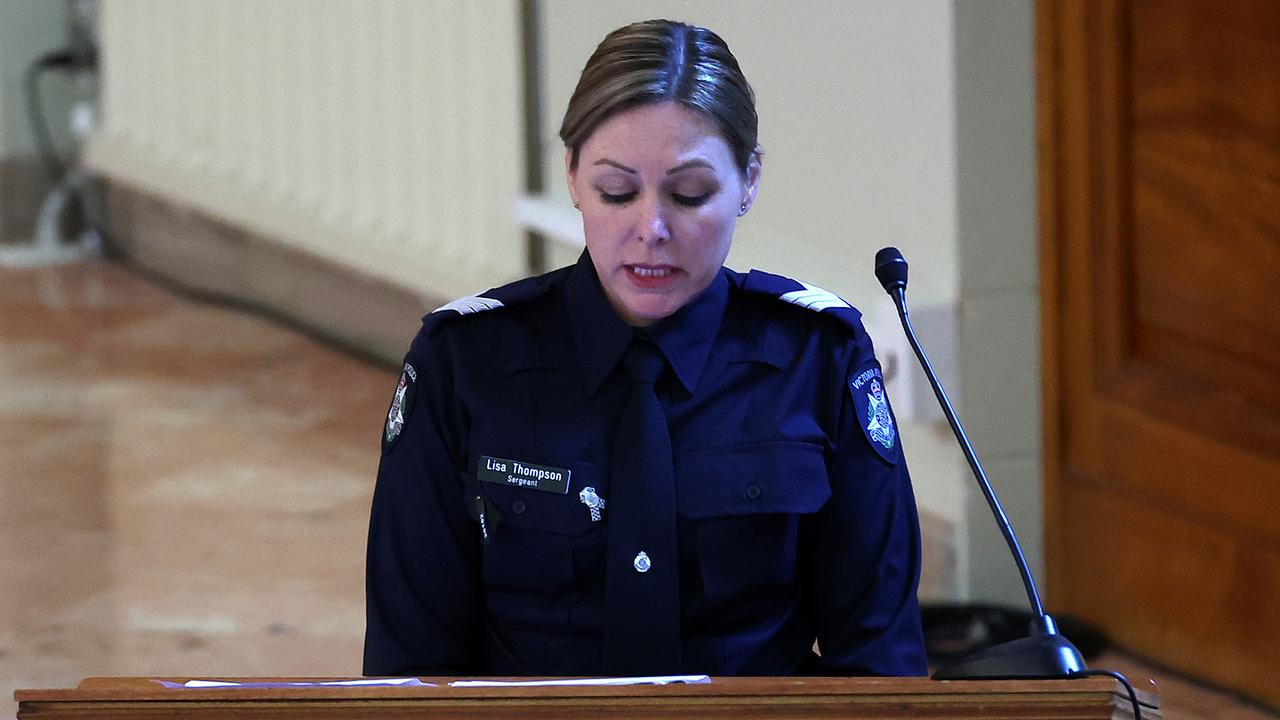
Several photos of Det Sen Const Thompson were on display in the chapel along with four medals, including a posthumously awarded Victoria Police Star.
A photo collage was shown, accompanied by Cher’s If I Could Turn Back Time.
His sister Lois Kirk told mourners she once chatted to her brother about his will.
He quipped he didn’t need one because he was never going to die.
“If only that was true,” she said through tears.
“You were the golden boy, the adventurer, the protector.”
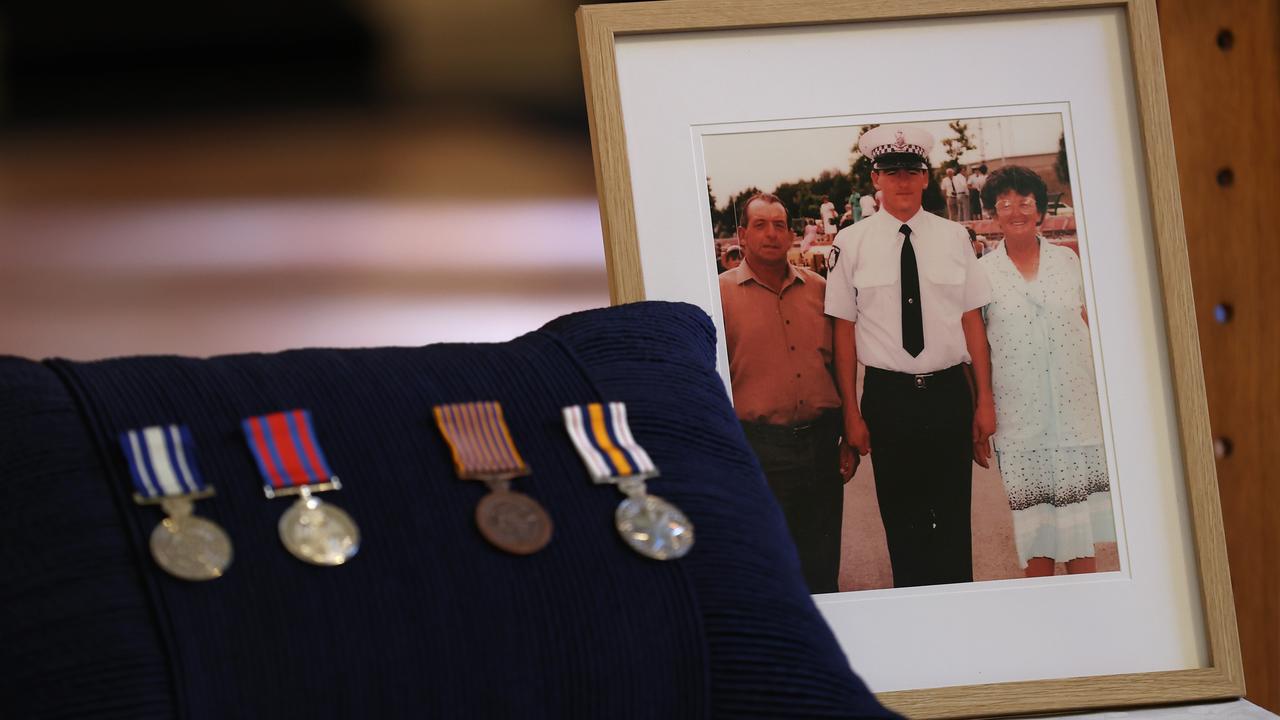
Det Sen Const Thompson joined the police in 1987 and worked his way up to being a detective at the Major Fraud Squad and the State Crime Squad, before shifting to Wangaratta to join the Crime Investigation Unit in 2007.
Colleague Paul Campbell said he made coming to work a pleasure and thought he was “indestructible”.
“Neal had previously been shot, stabbed, rolled cars and beaten cancer,” he added.
“He had also been in 16 police collisions, actually 17 – that was a couple of weeks ago.”
Det Sen Const Thompson was due to work his last shift on September 5 and had said ahead of his retirement he was “going to miss this stuff”.
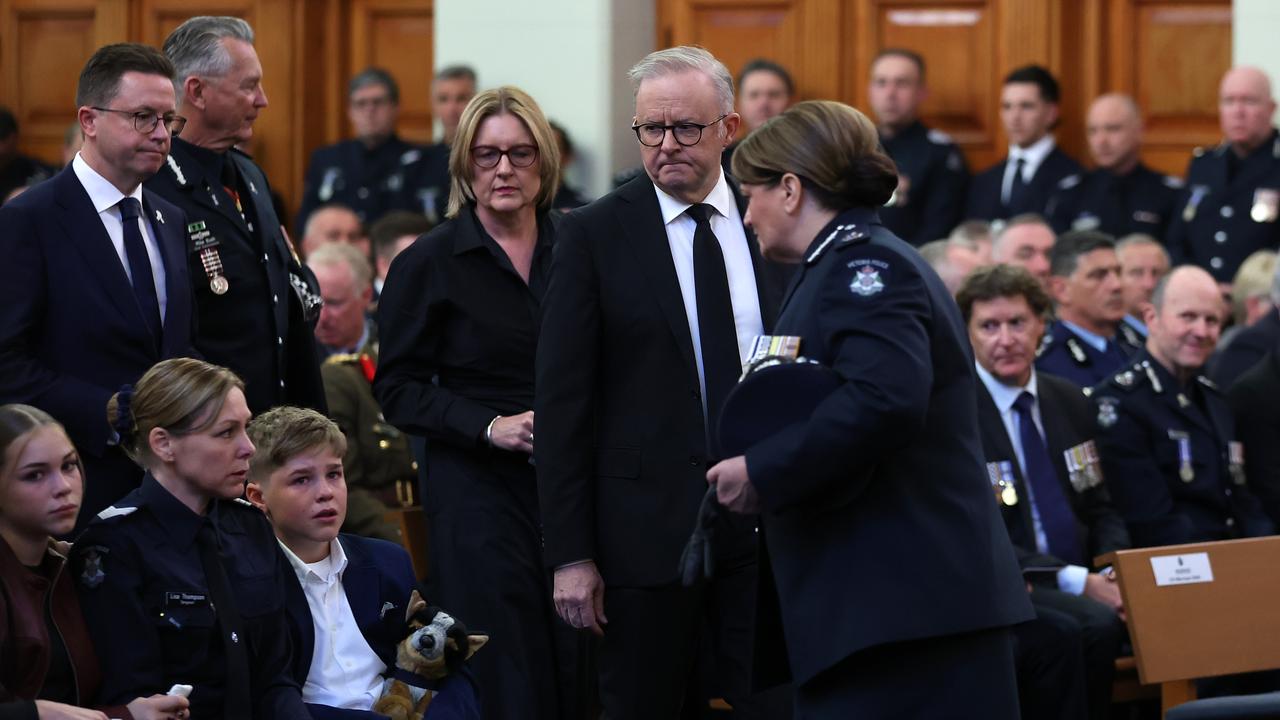
Speaking on behalf of Det Sen Const Thompson’s mates, Jason Williams said he had the “Steve Irwin gene” and told mourners about a trip 20 years ago to the Top End.
“Out of the blue, he started walking barefoot through the long grass after a king brown snake, dragging six-foot sharks into a 12-foot boat or jumping waist deep into waters inhabited by crocodiles,” he said.
Mr Williams said his friend would give you the shirt off his back and his last dollar, and urged those with him at the time of his death not to blame themselves.
“We know who to blame,” he said.
Uniformed members of the force formed a guard of honour after the service, as they did for Senior Constable Vadim de Waart-Hottart, who lost his life in the same incident.
Sen Const de Waart-Hottart’s parents also attended the service, along with the third injured officer who survived the alleged ambush by Freeman, who remains on the run.

Wiggles, ex-chief out of tune over ‘unlawful’ sacking
The Wiggles are playing hot potato with their former boss, denying claims he was illegally fired after raising concerns about the hiring of friends and family.
Luke O’Neill says he was denied bonuses and excluded from meetings before being dismissed without a reasonable basis by the famous children’s entertainers.
He has launched legal action against the group, blue Wiggle Anthony Field and its general counsel Matthew Salgo in the Federal Court.
No defence has been filed with the court but the band’s lawyer indicated on Monday the allegations were contested.
“There are multiple complaints or inquiries pleaded during the course of the applicant’s employment … all of which are denied,” The Wiggles’ lawyer Bianca Dearing said on Monday.
“We’re in the process of taking instructions on the finer points of the defence.”
Justice Michael Lee asked the parties to set out timetabling ahead of a potential hearing in April, noting he was “unclear about how long it will take”.
A preliminary estimate of three days was offered but the court was told it might be longer if other issues arose.
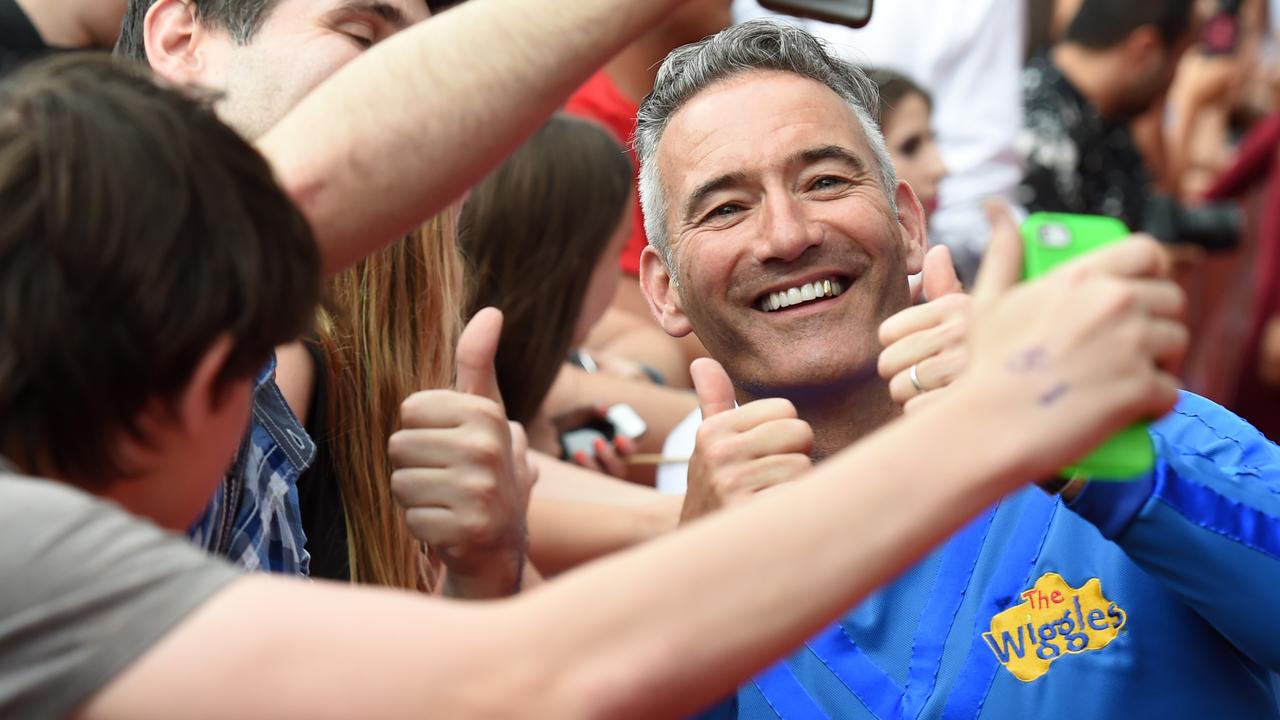
The Wiggles and its former chief executive will likely attend mediation before the end of the year to see if the issue can be resolved before a hearing, the court was told.
Mr O’Neill claims Field – the sole original Wiggle still performing in the group – questioned his competence and “undermined him” in front of more than a dozen staff at a meeting in February.
The former boss complained about the blue Wiggle’s nephew being hired to work on an upcoming album and a bonus scheme implemented for Field’s friend and daughter’s boyfriend without approval, in contrast to the usual scheme.
Field then allegedly took steps to reduce Mr O’Neill’s roles and responsibilities, according to court documents.
That included excluding him from meetings with department store Kmart about selling branded toys and emailing all staff about an intention to remove a tour promoter without prior consultation.
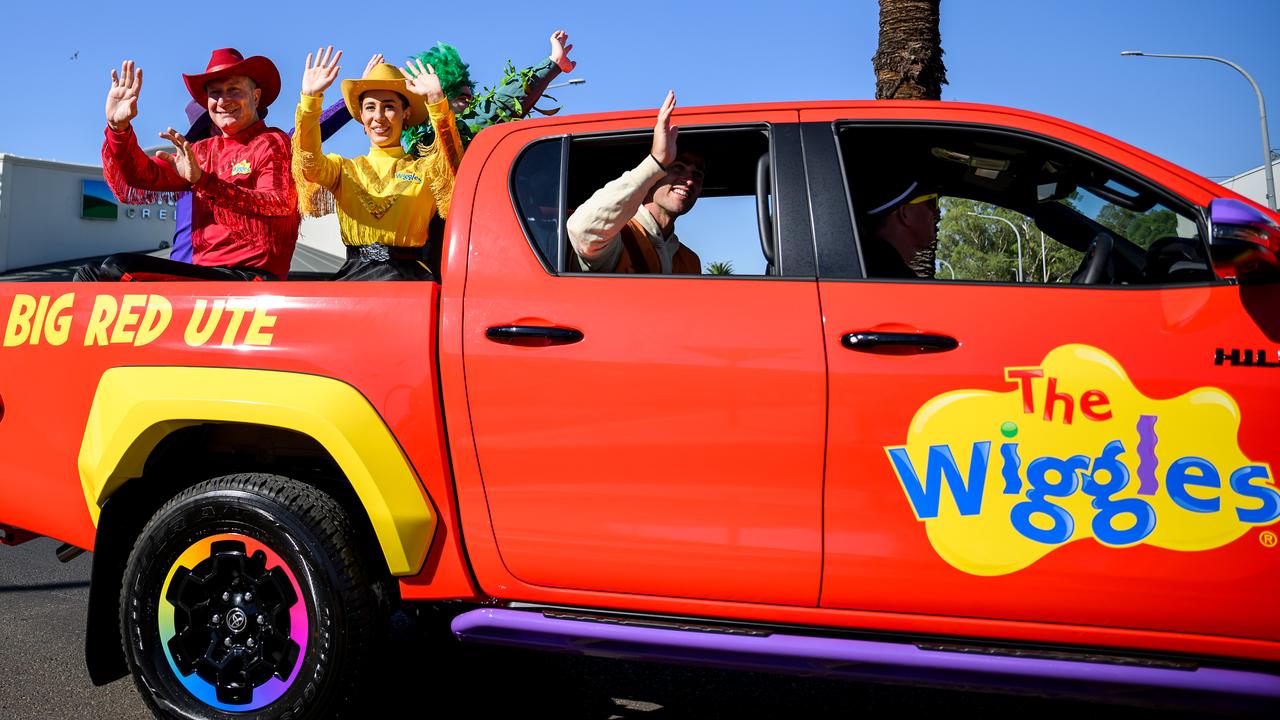
Mr O’Neill made multiple other complaints about staffing and other decisions allegedly made by Field without approval.
He eventually complained in April to the group’s director, red Wiggle Simon Pryce, that the decisions were creating budget overruns, endangering his bonus.
Pryce agreed his performance justified a raise after the three-decade-old group’s earnings increased from $2 million in the 2023 financial year to a forecast figure of up to $7 million in 2025.
But Mr O’Neill was fired in May, a decision he says came without a reasonable basis and without any prior warning or earlier adverse feedback.
He alleges his dismissal was unlawful and an adverse action taken by the Wiggles after he exercised his workplace rights.

The bonus payment of $86,000 he received in July was less than what he was owed, he claimed in court documents.
Mr O’Neill began working for The Wiggles in a consultancy role in April 2023 before becoming chief executive in January 2024.
He was tasked with implementing strategies to grow the group’s revenue, maintaining its budget and overseeing hiring decisions.
The Wiggles formed in 1991 and are among Australia’s top-earning and most widely beloved entertainment groups, winning multiple ARIA awards and being inducted into its hall of fame in 2011.
In 2022 they were recognised for outstanding services to Australian music at the APRA awards.
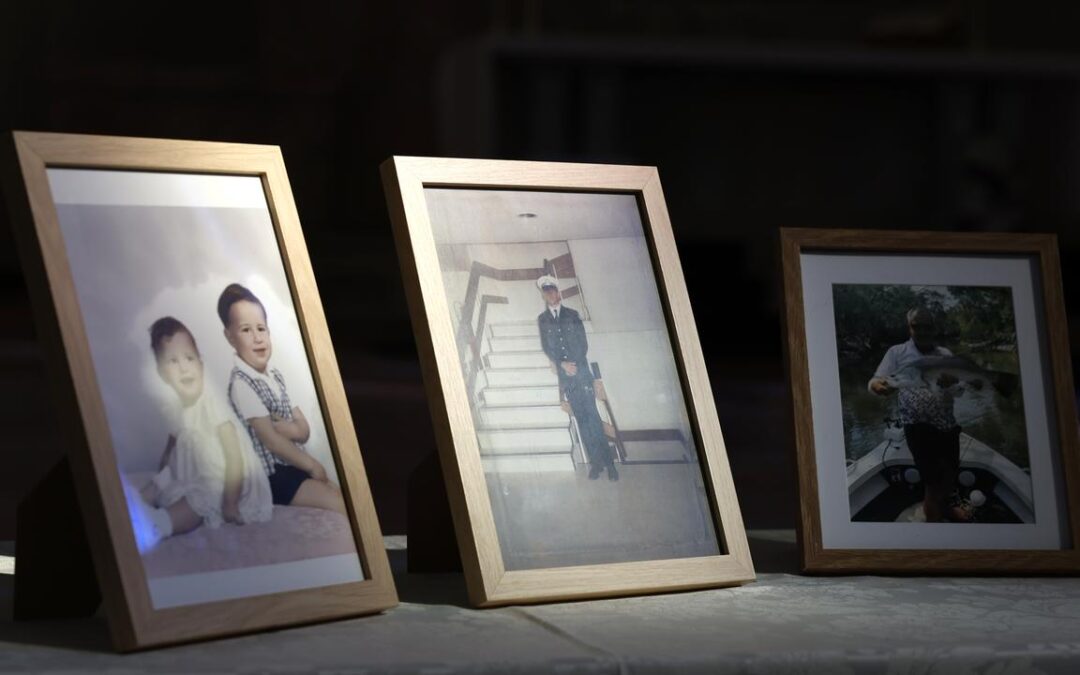
Mourners arrive to pay respects for slain retiring cop
Family, friends and colleagues are coming together to salute a veteran officer who was gunned down just days away from retiring, as the hunt for his alleged killer continues.
Detective Leading Senior Constable Neal Thompson will be farewelled with full police honours at a funeral at the Victoria Police Academy on Monday.
The 59-year-old was one of two Victoria Police officers killed on August 26 while serving a warrant on Dezi Freeman on a property in Porepunkah, about 300km northeast of Melbourne.
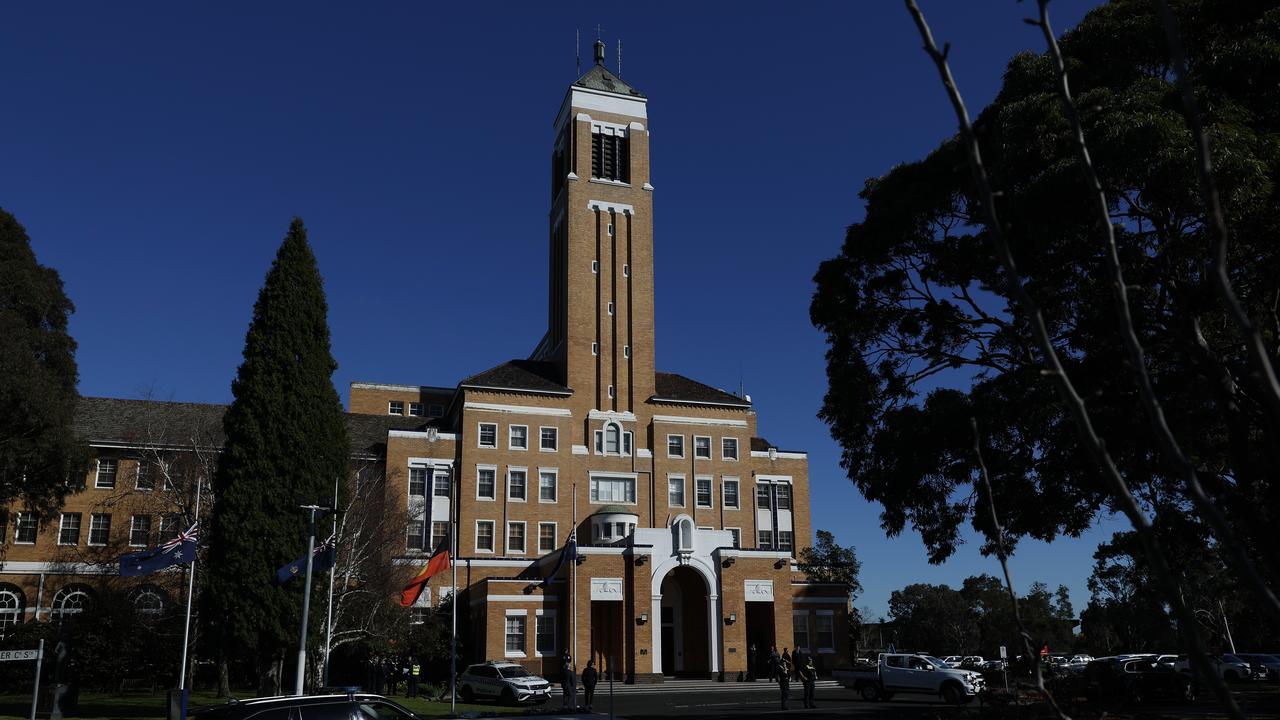
The officer was looking forward to spending more time with the love of his life, Lisa, and already had a list of tasks to tackle in his free time.
His partner, with whom he built a home, will be among the mourners expected to pack the on-site chapel at the academy in Melbourne’s east to remember the man affectionately known as Thommo.
Det Lead Sen Const Thompson deserved the life he had planned for after his policing career, state police union boss Wayne Gatt said.
“That, after 38 years in the job and on the cusp of retirement, he made the decision to put others before himself, is a measure of the man we’ve lost,” Mr Gatt said.
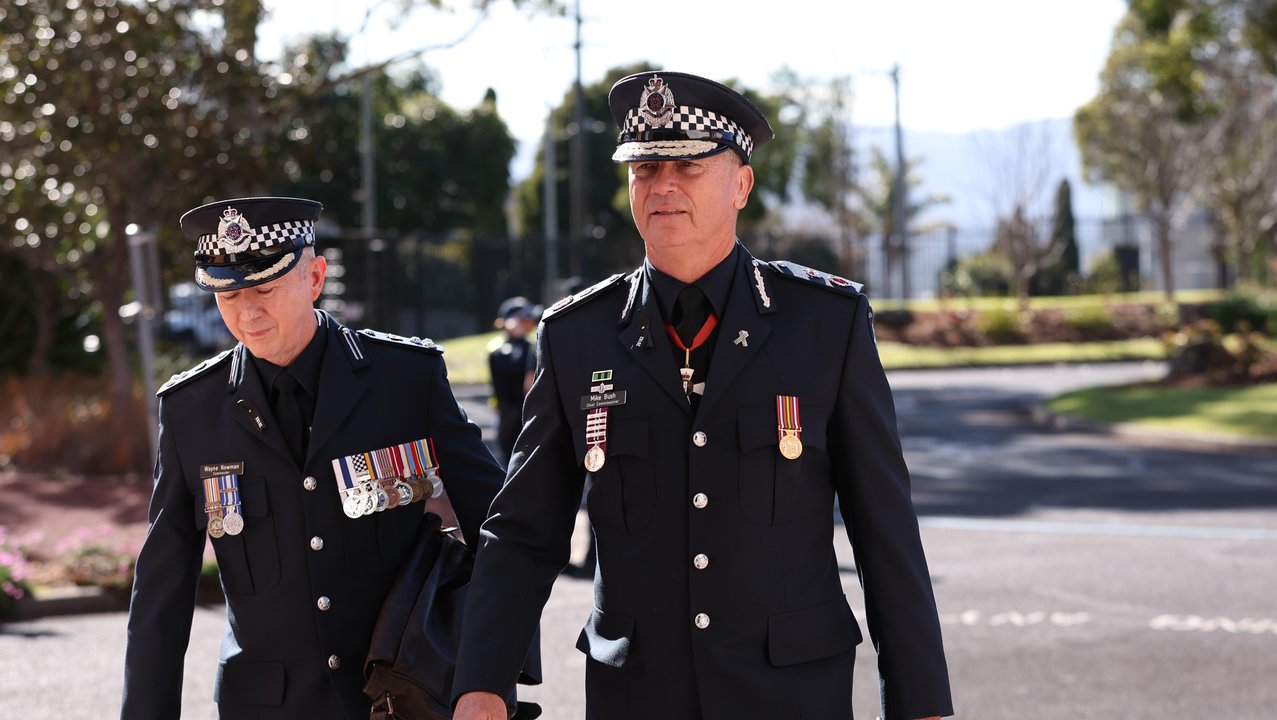
“Neal was often the light side of an at-times dark profession. A character, a mainstay and a comfort to many.”
Det Lead Sen Const Thompson was a laid-back adventurer, revelling in the great outdoors and regularly spending time in nature with friends and colleagues.
He joined the police in 1987 and worked his way up to being a detective at the Major Fraud Squad and the State Crime Squad, before shifting to Wangaratta to join the Crime Investigation Unit in 2007.
Uniformed members of the force will form a guard of honour after Monday’s solemn service, as they did for Senior Constable Vadim de Waart-Hottart, who lost his life in the same incident.
An estimated 3000 mourners attended the 34-year-old’s funeral on Friday, triple the number expected.

Sen Const de Waart-Hottart, a smiling protector with an enduring fascination for the Batman comic book character, received a send-off worthy of a real-life superhero.
The pair’s alleged killer remains at large after fleeing into bushland almost two weeks ago.
Hundreds of officers continue to look for him in Victoria’s high country.
A $1 million reward has been offered for information leading to the arrest of Freeman, 56, who was last seen wearing dark green or khaki tracksuit pants, a dark green rain jacket, brown Blundstone boots and reading glasses.
It’s the largest reward in Victoria’s history to be offered for an arrest, rather than a conviction.